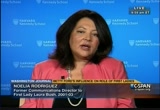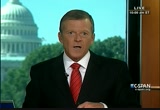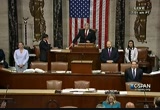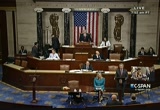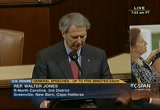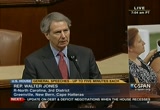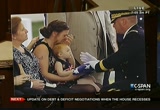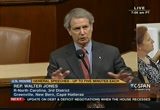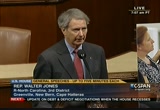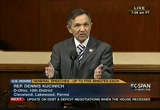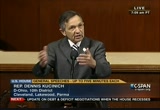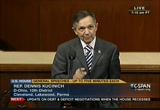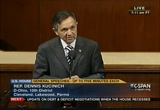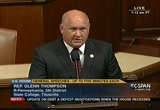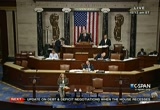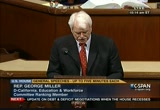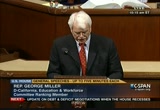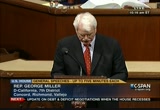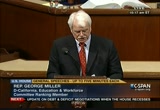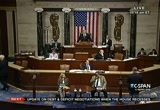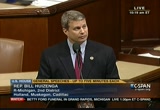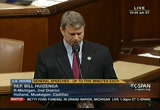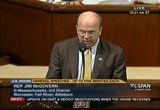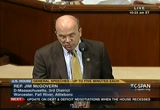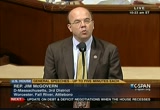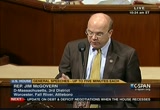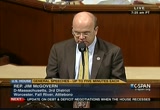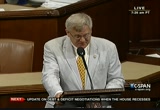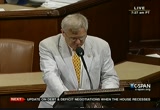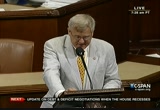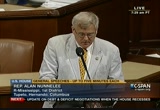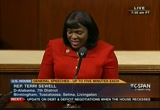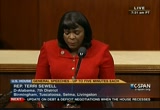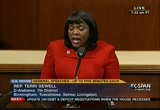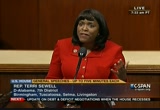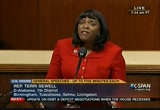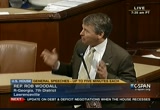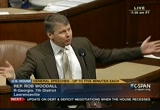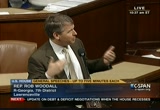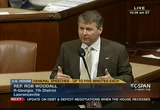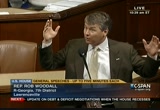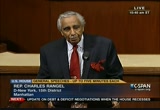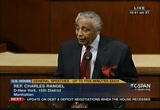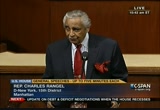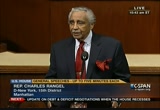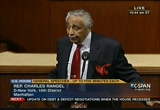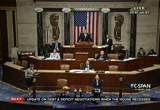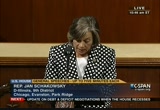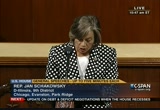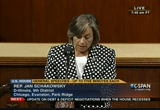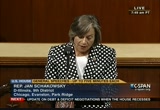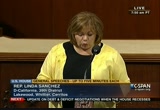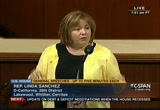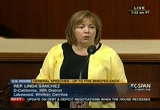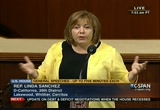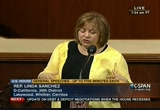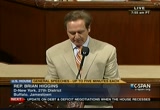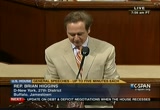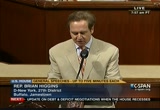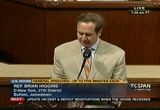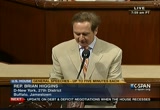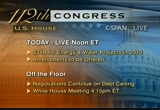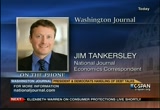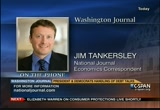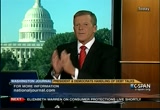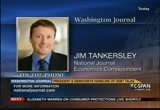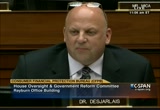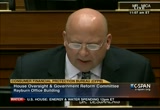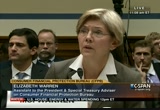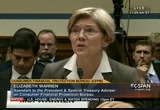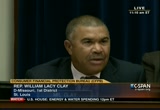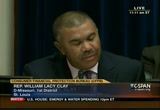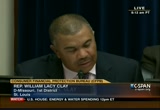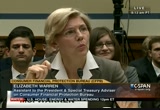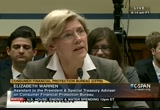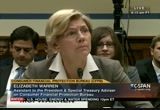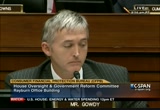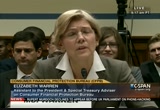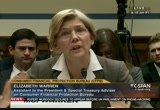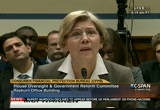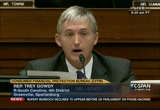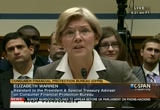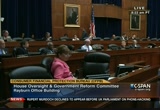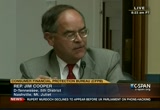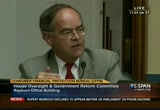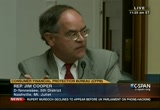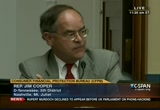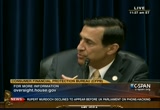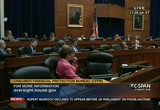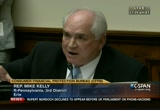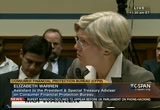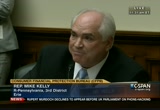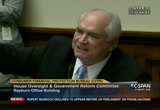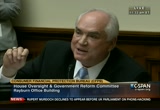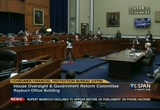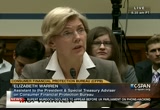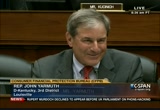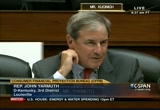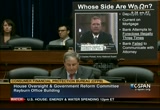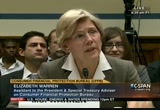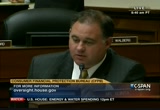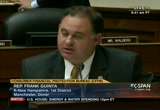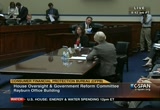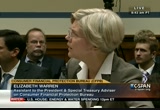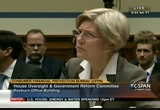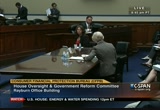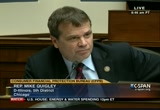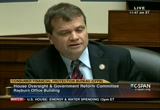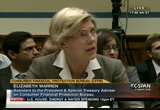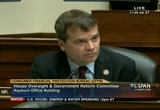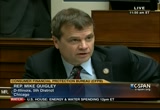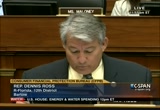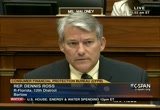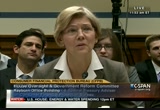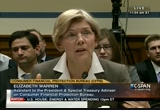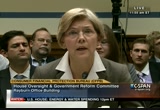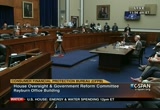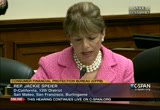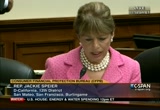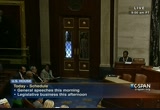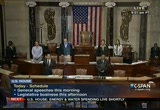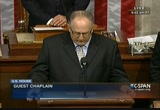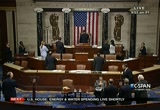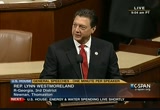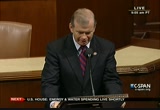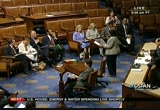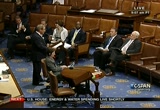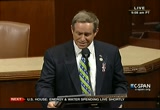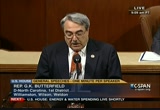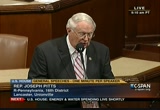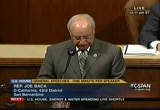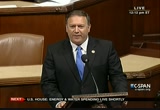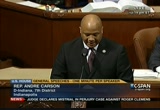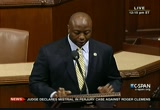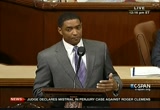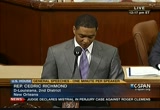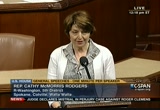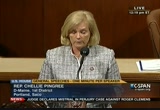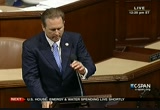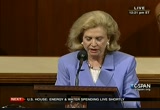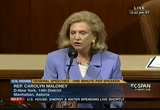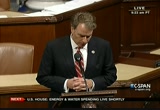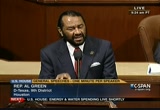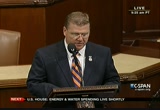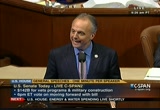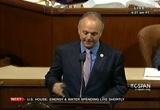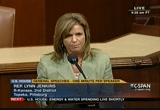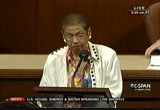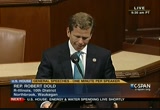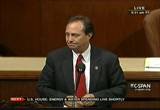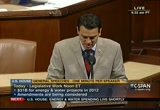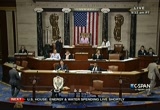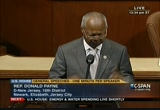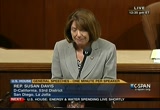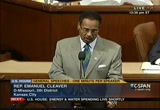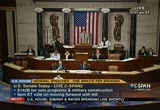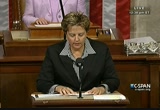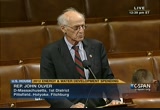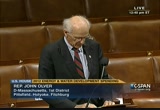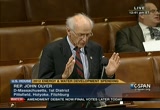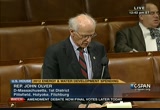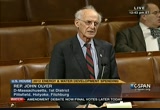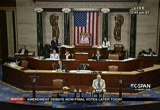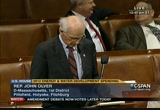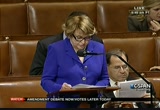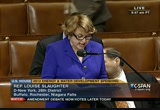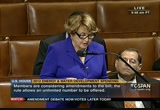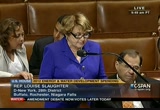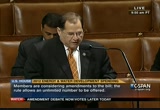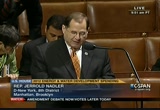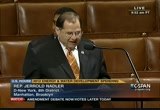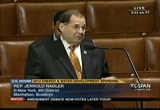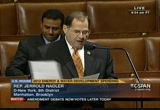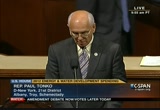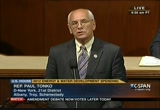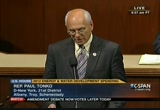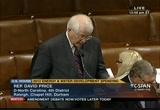tv U.S. House of Representatives CSPAN July 14, 2011 10:00am-1:00pm EDT
10:00 am
noella rodriguez? guest: that is an important point. an important aspect of having to deal with that disease is having the support system. the desert and the key to the betty ford center and it did was he to president bush's recovery and thousands of others -- it was a key to president bush's recovery and thousands of others across the country. it is important to remember that it was not very long ago that we could not even discuss this in public. the fact and the way that we are able to do that today is a tribute to betty ford. host: noella rodriguez, joining us from harvard, talking about the role of betty ford and first ladies in general. if we appreciate your being on the "washington journal" and a reminder the beginning of 1:30 p.m. eastern time, the betty ford funeral service will be on c-span.org.
10:01 am
if the house of representatives is now coming into session. [captioning performed by national captioning institute] [captions copyright national cable satellite corp. 2011] [captioning made possible by the national captioning institute, inc., in cooperation with the united states house of representatives. any use of the closed-captioned coverage of the house proceedings for political or commercial purposes is expressly prohibited by the u.s. house of representatives.] the speaker pro tempore: the house will be in order.
10:02 am
the chair lays before the house a communication from the speaker. the clerk: the speaker's room, washington, d.c., july 14, 2011 . i hereby appoint the honorable daniel webster to act as speaker pro tempore on this day. signed, john boehner, speaker of the house of representatives. the speaker pro tempore: pursuant to the order of the house of january 5, 2011, the chair will now recognize members from lists submitted by the majority and minority leaders for morning hour debate. the chair will alternate recognition between the parties with each party limited to one hour and each member other than the majority and minority leaders and the minority whip limited to five minutes each, but in no event shall debate continue beyond 11:50 a.m. the chair recognizes the gentleman from north carolina, mr. jones, for five minutes. mr. jones: mr. speaker, thank you very much. i plan to come to the floor at least once, maybe twice a week
10:03 am
until we get our troops home from afghanistan. i do that because i have the privilege to represent the third district of north carolina, the home of camp lejeune marine base, cherry point and seymour johnson air force base. i have been privileged since i didn't serve to have great relationships with active duty and retired marines in the district, and i want to share with this house, mr. speaker, that we continue to support a corrupt leader and a corrupt government. just recently, the half brother of mr. karzai, half brother named wali karzai, was murdered in afghanistan. this only reinforces the fact that afghanistan is in a fragile situation at every level of their government. it is in chaos, quite frankly. just this week i spoke with a marine colonel who's been to afghanistan three times.
10:04 am
he was in my office on tuesday, and he shared the same sentiments as the retired marine general who has been advising me for 20 months, and recently i emailed the general and said, please give me your ideas of what mr. obama has proposed in bringing 10,000 of our troops out in july and then another 23,000 in -- next year, 2012. and this is what he emailed back to me, mr. speaker, and i read, one, i think the timeline is too long. i think he needs to increase the number of troops coming out of country more and quicker. another point he made in his email is, get real with training and army police force. all we're doing is training eventual new members of the taliban. trainers are doing a wonderful job but we don't have the time to make an army. and, mr. speaker, then, it was kind of sad the way he closed. every day somebody from our
10:05 am
country dies. a marine, a soldier, an airman, navy, whatever. mr. speaker, i bring posters on the floor. i have probably 12 now that i want to bring on the floor every time that i speak to remind the house that there's pain in war. the wife to my left on the poster is in tears. the little girl who's about 2 years of age, she doesn't understand why this army officer is kneeling before her with a folded flag. but, yet, i will say to the little girl, when you grow older and you are old enough to know your daddy was a real hero, sergeant jeffrey shear, who gave his life for this country. mr. speaker, that leaves me to sharing with the house an editorial that was written about four weeks ago by eugene robinson and the title is "afghanistan strategy: let's
10:06 am
go," and i want to read from his editorial. slinder threads of hope are nice, but they do not constitute a plan, nor do they justify continuing to pour american lives and resources into the bottomless pit of afghanistan. the threat from afghanistan is gone. bring the troops home. this, again, is from an editorial from eugene robinson. mr. speaker, with our nation in such a financial crises, the people of the third district of north carolina, which i represent, asked me many times when i'm home on the weekends, why are we still in afghanistan, why are we still spending $10 billion a month to prop up a corrupt leader and there's no future in afghanistan? we are not going to change history. history has always said to these great nations like america, you go into afghanistan, you're never going
10:07 am
to change anything. the congress needs to join those of us in both -- on both sides of the aisle when we debate trying to bring our troops home from afghanistan. mr. speaker, before i close, again, i want to make reference to the wife in tears and the little girl looking up at the army officer wondering why are you giving me this flag. young lady, your daddy was a hero. i close, mr. speaker, by saying to god, please bless our men and women in uniform. god, please in your loving arms hold the families who have given a child dying for freedom in iraq and afghanistan. god, please give wisdom, strength and courage for president obama that he will do what is right. and three times, god, please, god, please, god, please continue to bless america, and i yield back the balance of my time.
10:08 am
the speaker pro tempore: the chair recognizes the gentleman from ohio, mr. kucinich, for five minutes. mr. kucinich: the debate over the debt belies a fundamental truth of our economy that it is run for the few at the expense of the many. that our entire government has been turned into a machine which takes the wealth of a mass of americans and ack tell rates it into -- accelerates it into the hands of a few. let me give you some examples. take war. war takes the money from the american people and puts it into the hands of arms manufacturers, war profiteers, private armies. the war in iraq based on lies. $3 trillion will be the cost of
10:09 am
that war at least. the war in afghanistan based on a misreading of history. half a trillion of dollars in expenses already. the war against libya will be $1 billion by september. 50% of our discretionary spending goes for the pentagon. a massive transfer of wealth into the hands of a few while the american people lack sufficient jobs, health care, housing, retirement security. our energy policies take the wealth from the american people and put it into the hands of the oil companies. we could be looking at $150 a barrel in the near future. our environmental policy takes the wealth of the people, clean air, clean water, and puts it in the hands of the polluters.
10:10 am
it's a transfer of wealth. not only from the present but from future generations as our environment is ruined. insurance companies, what do they do? they take the wealth from the american people in terms of what they charge people for health insurance and they put it not -- it into the hands of the few. we have to realize what this country's economy has become. our monetary policy, through the federal reserve act of 1913 , privatized money supply, gathers the wealth, puts it in the hands of the few while the federal reserve can create money out of nothing, pocket it to the fed and our small businesses are starving for capital. mark my words -- wall street cashes in whether we have a default or not. and the same type of thinking that created billions in
10:11 am
bailouts for wall street and more than $1 trillion in giveaways by the federal reserve today leaves 26 million americans either underplanned parenthood or -- under employed or unemployed and people under the age of 55 not going to get social security. there are tax cuts for the rich and for endless wars. there is a massive transfer of wealth from the american people to the hands of a few and it's going on right now as america's eyes are misdirected to the political theater of these historyonic debt negotiations, threats to shut down the government, willingness to make the most americans pay dearly for debts they did not create. these are symptoms of a
10:12 am
government which has lost its way, and they are a challenge to the legitimacy of the two-party system. i yield back. the speaker pro tempore: the chair recognizes the gentleman from pennsylvania, mr. thompson, for five minutes. mr. thompson: thank you, mr. speaker. mr. speaker, i rise today to recognize a dear friend and colleague, dr. john shank, and congratulate him on his retirement from temple university. dr. shank has a 10-year professor at temple university where he serves as director of the therapeutic recreation program.
10:13 am
in his 25 years of tremendous service to temple, professor shank has put forth a level of commitment to the advancement of the professional knowledge within the field of recreational therapy this is second to -- that is second to none. his scholarly successes have contributed to the university of being the most prolific academic research center in the field of therapy. not only has he made tremendous contributions to his field, he served as an outstanding teacher and role model to those students who had the fortunate enough to have him as a teacher. dr. shank, thank you for your academic achievements and for your contributions to the recreational therapy field. congratulations on your retirement. good luck in the future. thank you, mr. speaker. i yield back the balance of my time. the speaker pro tempore: the chair recognizes the gentleman from california, mr. miller, for five minutes. mr. miller: i ask unanimous
10:14 am
consent to revise and extend my remarks. the speaker pro tempore: without objection. mr. miller: mr. speaker, members of the house, very shortly the united states congress is likely to consider three ill conceived and ill-timed trade agreements that will do nothing to create jobs in this country. one of these agreements is with the nation of colombia. one of our most important responsibilities as elected officials is to promote and protect american jobs and american values. we do this by ensuring that those who receive trade preferences respect essential democratic rights. these are important rights. the rights to speak out and protest, the rights to organize unions and bargain collectively and the right for citizens to improve their economic condition without reprisals. unfortunately, we see what happens when union members in colombia tried to exercise their rights. death squads are unleashed. union leaders are gunned down in broad daylight. this isn't yesterday's news. the intimidation of violence continue this day. there have been 17 confirmed
10:15 am
killings of unionists in colombia this year, according to a human rights group. last year 90 unionists were murdered worldwide. 49 of them in colombia. colombia unionists face the highest rate of murder in the world. languagestanding objections to the colombia free trade agreement, president santos of colombia and president obama signed a labor action plan on april 2. it included deadlines for new laws that could enable workers to form unions as a means to advance social progress in colombia. this plan has deadlines to restrict the use of cooperatives that allow employers to evade bargaining directly with their workers. it calls for new labor enforcement agencies and the hiring of additional inspectors. on the one hand the labor action plan has important elements that are necessary and valuable. president santos is to be commended for advancing this initiative. however, there are major gaps in the action plan. there are no benchmarks to show
10:16 am
whether or not the new laws are on paper have been translated into laws on the ground. real workers have greater ability to exercise their rights to organize, to bargain collectively, to negotiate contracts directly with employers. levels -- will levels of violence be substantially reduced. will they be punished as prescribed under the new law? we don't know if they are merely gains on paper or whether they are real. based on the anticipated schedule, it appears we won't be given a chance to learn if there will be real change on the ground before we consider the trade agreement with colombia. any trade agreement with colombia must have a verifiable reduction in violence, it must end paramilitaries. due the lack of benchmarks for progress, colombia could have a record year of assassinations and the action plan would be declared a success. under the plan the colombian
10:17 am
government is supposed to be providing the expanded protections for union activists. i met with them last met and said little has changed on the ground. they said they have not received protection. it has the hiring of labor inspectors to enforce these new laws. there's a program to relocate teachers who received death threats and address the backlog of thousands of union homicide cases that have yet to be prosecuted and there's no assurance that the actions will be carried out. . last week the ways and means republicans opposed efforts to require colombia to meet the obligations as of the date the free trade agreement goes into force. without this provision the u.s. has no leverage to assure implementation of the labor action plan. maybe that is what the multinational corporations pushing this deal want. since the agreement is being brought to the floor under fast track, congress will not be able to consider amendments to make the action plan enforcible. given this predicament, the
10:18 am
least the administration can do is stand behind its own action plan. the implementing legislation should require colombia to fully comply with the plan before the agreement takes effect. the administration should confirm the compliance is on the ground consultations with labor and human rights organizations, without real change on the ground, this trade agreement is not fair to colombian workers. they deserve the basic rights not to be subjected to threats and murder because they demand a better life. this agreement does not fairly represent our nation's values and its fundamentally unfair to america's workers. they can't compete with workers who face death squads for wanting better working conditions. they can't compete with a country that continues to allow thousands assassins to operate with immunity. it's past time we as a nation stand up for american values and workers. i yield back. the speaker pro tempore: the chair recognizes the gentleman from michigan. for five minutes. mr. huizenga: thank you, mr.
10:19 am
speaker. i rise today to pay tribute to a great american with a legacy of being a passionate advocate for the issues that she believed in. former first lady betty ford passed away earlier this week at the age of 93. she was known as a beacon of warmth and kindness. she was also a tough lady. she's being buried today next to her husband, jerry ford, in grand rapids at the presidential museum. my entire family and i had opportunities to meet her over the years and i have to say it's truly an honor now to represent part of the district that jerry ford had so long served in this very house. we are all deeply saddened by her passing. mrs. ford cared deeply about others as evidence in her work helping people through their addiction and recovery of dependency through the betty
10:20 am
ford clinic, and raising awareness to breast cancer at a time when those things were not discussed much in public. above all, she led the ford team as she supported her husband's service to a nation with admirable love and mutual respect. at times literally being his voice like she did that evening that he made his concession speech in 1976. this spring at the dedication ceremony of the statue of president ford here in the rotunda just beyond, we are reminded of his calm, steady leadership and ability to reach out to others. they were always a team. and it was much a tribute to her as it was to president ford. again, we continue to pray for the ford children, susan, jack, mike, and steve and the entire family as we pay tribute to their mother and the legacy she leaves behind. rest well, mrs. ford. rest well.
10:21 am
the speaker pro tempore: the chair recognizes the gentleman from massachusetts, mr. mcgovern. mr. mcgovern: i ask unanimous consent to address the house for five minutes. the speaker pro tempore: without objection. mr. mcgovern: mr. speaker, six days ago on friday, july 1, armed men assassinated a candidate for city council of a town just outside of colombia. he was the ninth local candidate murdered over the past few months. last thursday, june 30, luis eduardo, investigating links between paramilitary groups was shot down in an area i first visited in 2001. he was 70 years old. he was returning home at night with his wife when he was gunned down. he was murdered a few days after another witness was killed. and investigators for the attorney general have said several other witnesses have
10:22 am
disappeared. antonio mendoza morales was a councilman in the caribbean town , the 34-year-old mendoza was also lead of the association of displaced persons. he was also shot and killed last thursday night. he is at least the 11th land claims victims rights or displaced persons leader to have been killed in colombia so far this year. displaced and victims rights add vow cats in this region -- advocates in this region received death threats in june. we don't know if mendoza's killing is related to them. but i traveled there in 2003 and can attest to the daily violence suffered by local leaders and displaced organizations. on june 7 anna core dobea -- core dough ba, was shot dead by an unidentified gunman while riding on a bus.
10:23 am
she had fled her home in 2001 after several of her family members were killed. she had been campaigning for the restitution of lands that colombia's displaced and was a recommend of a peaceful path, a woman's organization calling for negotiated end to the war. in 2008, they testified before the tom lantos human rights commission about colombia's internally displaced. cordoba had been receiving death threats for months. she had asked that the colombian government for protection, but had not received any. her children have received death threats following her -- their mother's death. the inter-american commission for human rights condemned the murder and expressed alarm over the increase in serious threats against colombia and human rights defenders. the situation is getting worse. every day i receive news of threats, murders, and
10:24 am
disappearances of colombian labor and human rights advocates and community leaders. mr. speaker, i recite this sad litany to impress upon my colleagues these are real people, real leaders being murdered every single day in colombia. will their murderers be brought to justice or will their deaths be just one more case that remains in impunity? will the government's promises to their families to seek justice be fulfilled? will other threatened leaders and their families receive real protection? i hope so, but we simply don't know yet. promises are easy, results take time, commitment and political will to achieve. this morning some of my colleagues will describe the dangers facing colombia's labor activists. colombia still remains the most dangerous place in the world to be a unionist. violence against colombia's workers happens in the context of a very threatening landscape for anyone who has the courage to organize their communities, run for public office, or stand up for the rights of the poor and displaced and the victims of
10:25 am
human rights abuse. the source of violence are all the illegal armed actors, the farc, paramilitaries, and criminal networks. and also it sadly includes members and units of the colombian military and police. before any trade agreement is brought to the congress for a vote, we owe it to the brave people of colombia to give the santos administration time to demonstrate that it can carry out the historic reforms that it has announced as its priorities. we need time to see if the initial steps required by the u.s.-colombia labor action plan actually result in changes on the ground inside colombia. will workers be able to exercise their rights? organize freely? bargain directly with their employers without the fear of death? and we need time to determine whether violence against rights defenders and community leaders is actually reduced under the leadership of president santos and whether greater protections are provided and prove to be
10:26 am
effective. we need to see and we should demand to see results on the ground before colombia takes up the free trade agreement. let's use whatever leverage the u.s. has with colombia to help end a culture of impunity and violence that by any standard is intolerable. i cannot approve an f.t.a. on the basis of good intentions. it must be based on results. mr. speaker, in conclusion, let me just say trade agreements should be about lifting people up not keeping them down. i yield back the balance of my time. the speaker pro tempore: the chair recognizes the gentleman from mississippi, mr. nunnely. mr. nunnely: thank you, mr. speaker. last week we learned that the economy added a meager 18,000 jobs. and unemployment rate went up to 9.2%, far from the 6.7% that president obama claimed it would be today if the stimulus bill had been signed into law. mr. nunnelee: far too many
10:27 am
americans are looking for jobs. yet the president insists that tax increases are the way to fix washington spending problems. tax hikes that will destroy jobs and destroy the job -- confidence that our job creators need to hire new employees. to keep american jobs here, we don't need to raise taxes. we do need to get our fiscal house in order. 22 americans search daily for full-time work. the worst sustained unemployment streak since the great depression. to these americans, there's no end in sight. for them, unemployment's not a rate, it's a reality. our job crisis has everything to do with our spending crisis and our debt crisis. if we hit the august 2 deadline, the united states government will face what many americans have felt, too much month left at the end of our money.
10:28 am
we simply won't have enough money to pay our bills. americans have had to make that decision time and time again. at the end of the month they have to decide what to pay first, the mortgage, the electric bill, the grocery bill, or the car payment. now, i'll be very disappointed if in making those decisions the administration chooses to play politics. we need to make sure we pay social security, interest on the debt, medicare, and our troops that are standing in harm's way. american people want real solutions and the house of representatives has committed to a long-term plan. we voted for a budget that would make washington start living within its means. even the president's own chief of staff has said that in five years medicare is going broke. however, it's been 800 days since our friends in the senate
10:29 am
have passed a budget. and they have nine house-passed jobs bills sitting in their hands but they refuse to act on any of them. a recent poll shows that only 17% of mothers believe that their children will have a better life in the future. at every town hall meeting i ask participants whether they think their grandchildren will live a better quality of life than they live. the response is slim. if congress is going to be asked to raise the debt ceiling, we must have a long-term plan to fix washington spending problems. house republicans have made our demands clear. we will not raise the debt ceiling without spending cuts larger than an increase in the debt ceiling. we will not raise the debt ceiling without structure reforms that restrain future spending and guarantee we won't get into this mess again. and i'm not interested in a temporary band-aid. we also voted -- already voted
10:30 am
no on raising the debt limit without cuts. we didn't get into this problem because taxes are too low. we are in this situation because of run away spending and the failed economic policies of this administration. we need to move forward and solve this crisis in a responsible way. thank you, mr. speaker. i yield back. the speaker pro tempore: the chair recognizes the gentlelady from alabama, ms. sewell, for five minutes. without objection. ms. sewell: mr. speaker, i rise today to recognize the accomplishments of mr. fredrick douglass iii from selma, alabama. after more than 50 years in the floral business, mr. fred d. williams iii retired on june 30, 2011. a fixture in the selma community for more than five
10:31 am
decades, fred williams provided his floral expertise for countless weddings, graduations, funerals and other special occasions. in the seventh district of alabama and throughout the southeast. fred's flower and gift shop opened on october 15, 1956, and served as a vital part of the selma community. he comes from a family of entrepreneurs and public servants. his parents were pillars in the city of selma and served as role models for the entire community. his mother, ms. mary ellen williams, was a beloved educator, and his father, fred d. williams jr., was a wise and generous business owner. his father owned j.h. williams and sons funeral home, established in 1905, and still in operation today in selma, alabama.
10:32 am
the williams family were pioneers in a time when african-american businesses were few or nonexistent. the opening of fred's flower and gift shop was an extension of his family legacy. fred williams spent most of his formative years in selma. he moved with his family to richmond, virginia, in the 1950's, where he graduated from maggie l. walker high school. he then went on to attend the historic fillman college in tuscaloosa. he returned to his hometown of selma and opened his flower shop in 1956. for 45 years, fred williams was married to martha j. williams who passed away on july 15, 2003. their marriage was blessed with three -- with two children, kay francis williams, who is married to orel johnson of alexandria, virginia, and kimberly joyce williams, who is married to john dillon of bloomington, minnesota.
10:33 am
he has two beautiful granddaughters, mckenzie, who is 13, and madison, who is 7. for over 50 years as selma's premiere florist, fred williams shared his creative genius, creating exquisite floral arrangements, providing service to his customers and serving as an inspiration to all small businesses. fred williams is loved, admired and highly respected by the entire selma community, and i am honored to call him uncle fred. his retirement will be a great loss to the business community, but i know that his commitment to bettering selma will remain unwavering. on a personal note, i grew up in the williams household, and his daughter, kim, and i were childhood best friends. in fact, there is not a childhood memory that i have that does not include being with the williams family or being in my many visits to fred's florist. because of the closeness of my
10:34 am
family that we shared with the williams family over these many years, i have always affectionately known him as uncle fred. through his business and philanthropy, uncle fred has made an indelable mark on the community in selma, alabama, and i am extremely grateful for the part he played in raising me. i would like to sincerely thank him for his fortitude in over 50 years of service. the community of selma and the state of alabama appreciates your public service and commitment to business excellence. therefore, i, terri sewell, representative in the united states congress do hereby recognize mr. fred d. williams iii for his numerous contributions to the community of selma, alabama. i ask those present today to join me in honoring fred d. williams iii on his retirement and for his many
10:35 am
accomplishments in the community of selma. thank you. the speaker pro tempore: the chair recognizes the gentleman from georgia, mr. woodall, for five minutes. mr. woodall: thank you, mr. speaker. i came to the house floor today to talk about the big deal. the big deal. every time i open up a newspaper, mr. speaker, this week it's been talking about the big deal. the big deal that's going on at the white house. i want to set the record straight here today. the big deal happened right here on the floor of this house when the only budget that's passed in all of washington, d.c. all year long, cutting $6 trillion in spending was passed by this body, mr. speaker. that's the big deal. $6 trillion agreed upon by this united states house of representatives. now, i know down at the white house they're talking about the big deal as $3 trillion in spending cuts. $6 trillion, mr. speaker. the big deal started right here. now, you know, mr. speaker, i'm a big fan of the open process we had in this house where
10:36 am
every single member of the house of representatives come here and have their voice heard, offer their ideas heard and offer their opinions. i have a vote tally from that week voting on the budget. the congressional caucus came to the floor of this house, was debated, considered. it received 103 affirmative votes. 103. the republican study committee budget came, debated in this house, 119 affirmative. the progressive budget caucus came. 77 affirmative votes. congressman van hollen brought a democratic alternative. 166 affirmative votes. the only budget to get 218 votes, mr. speaker, was the house budget committee budget with 235 yes votes. 235. now, that's a budget that was weighed out line item by line item so everybody in america
10:37 am
could see what we were doing to achieve these savings to change the direction of our borrowing and our spending. now, no one even introduced the president's budget in this body, mr. speaker. no one brought it. the senate brought the president's budget and it was defeated 0-97. the united states senate, mr. speaker, defeated the president's budget 0-97. now, they brought the house-passed budget over there. it received 40 affirmative votes. still couldn't pass a budget. as my colleague said earlier, it's been over 800 days since the senate passed a budget. now, i know the president has come back out and talked about some alternatives, some things he would do differently from the budget he offered in february, differently from that budget that got zero votes in the senate, and the budget committee hearing we asked the other day to the congressional budget office director, what's the score on the president's new plan and the office told
10:38 am
us, mr. speaker, that they can't score a speech. they can't score a speech. i think that's true. i think that's true. there's a lot of talk in this town but there's not a lot of line item by line item putting the money and name and vote by where it is. $6 trillion to help get this country back on track. i want to say, mr. speaker, it did it by not cutting one penny from the benefits that seniors are receiving today. not one. so seniors, even those over 55, mr. speaker, even those over 55 would continue to receive the same medicare program that seniors are receiving today. so those over 55 would receive the same social security benefits that those folks who are receiving those benefits today. i cannot believe when i open up the front page of the newspaper
10:39 am
i hear folks talking about social security benefits might not go out the floor, veterans' benefits might not go out the floor. we have a plan that will get those checks out the door. it cuts $6 trillion in spending. it is responsible. it bends the budget curve going forward over the next 10 years, and it gets those checks out the door. mr. speaker, i don't know what's going to happen over the next three weeks. i don't know where this town is going to go. this town is a tough town to predict. i know that this house has put its mark in the sand. this house has brought every single budget committee alternative that was offered to this floor, we voted on each and every one and the only one to pass this house was the big deal, $6 trillion. it gets our seniors and our troops paid on august 3, mr. speaker. i encourage my colleagues to rally around that and let's give the american people what
10:40 am
they deserve and that's some certainty in this budget process. i yield back my time, mr. speaker. the speaker pro tempore: the chair recognizes the gentleman from new york, mr. rangel, for five minutes. mr. rangel: i ask unanimous consent to revise and extend my remarks. the speaker pro tempore: without objection. mr. rangel: mr. speaker, my colleagues, we have the opportunity to debate whether or not our brave young men and women are fighting in wars in foreign lands that has not been approved by the congress. as we talk in terms of trillions of dollars as to the national debt that we have acquired and think of ways we can reduce it, as we look at our revenue code and recognize that it is just so totally unfair and should be reformed and revamped, millions of people have awakened this
10:41 am
morning unable to really consider these important issues because they are without work. millions of people have lost their self-esteem, have lost their jobs. some have lost their health insurance. many have lost their homes. others have pulled their kids out of college. cars have been lost because of the inability to pay, and credit has just been nightmares to them. including in this vast amount of people are african-americans, many who have served this country, hardworking people that find themselves not at the 9.2% so-called unemployment rate but at a 16% unemployment rate. and this doesn't take into account the millions of people
10:42 am
and especially african-americans that there are no jobs for them. and going to the unemployment office just to be counted among the faceless unemployed doesn't make sense. included among them are veterans that some have fought for this country, some have come home with physical and mental problems but they have not received the support or the transitional aid that's necessary for them to assimilate in an area that has no jobs. so many of these people have worked in local establishments, in our butcher shops, our cleaners, our shoe repair, and they are without work. so many of them are women that have toiled and raised their families without the assistance of anyone else and they, too, are without work and without
10:43 am
hope. as we think about these people and think about reduction of our spending, we find that many and medicaid -- medicare and medicaid and social security seems to be constantly referred to as entitlements and people talk about that it has to be protected. so many mayors and governors are talking about they, too, have to cut their budgets. and so many african-americans, for reasons that i do not have to go into, have sought public service as a way of life because of the security that's involved in it. and so when we talk about cutting the budget and cutting the services that are provided, we're talking about a larger number of minorities that will be losing their jobs as a result of budget cutting.
10:44 am
whether we're talking about teachers or policemen or clerks that work in the city hall or the communities that have governors that have slashed back their jobs. but certainly as we talk about medicaid and medicare, we're talking about hospitals, and all of you know no matter where you come from that you see a large number of african-americans working in the institutions, trying to get education to move forward because we know a large number of the health care providers that we need, we are proud to say in the city of new york that we have been able to train and educate a larger number of percentage of physicians that all of the teaching hospitals that we have throughout our great country. and we're proud to do that. all of a sudden we hear that some $300 billion will be cut
10:45 am
from the hospitals that provide this care. and it's not just about the beneficiaries that you and i know that need this care and they won't be put in harm's way, but we have to acknowledge that many of the people that work in these hospitals, a large number of them being minorities, they, too, would be released to join the unemployed. . while i'm praying for the spiritual leaders to protect the vulnerable, please understand every time we cut in the budget we are cutting someone's job and they will join the hopeless and the unemployed. thank you. the speaker pro tempore: the chair recognizes the gentlelady from illinois, ms. schakowsky. ms. schakowsky: i ask unanimous consent to revise and extend my remarks. the speaker pro tempore: without objection. ms. schakowsky: thank you, mr. speaker. i rise today to express my
10:46 am
ongoing concern about human rights abuses in colombia and to oppose any consideration of the pending united states-colombia free trade agreement until tangible and sustained progress is seen on the ground. colombia has a long-standing legacy of serious and pervasive human rights violations. trade unionists, members of indigenous groups, and human rights defenders have been particular targets for violence. despite some positive rhetoric by the santos administration about improving protection of human rights, serious abuses continue. in one recent incident reported by human rights watch, seven people were massacred in southern colombia on july 2. reportedly by farc guerrillas. on june 25, another eight people were killed also in the southern part of the country. in both cases children were
10:47 am
among those killed. according to human rights watch, there were 17 such massacres between january and may, 2011, resulting in a total of 76 deaths, a 21% increase over the same time period in 2010. several members of indigenous groups have been targeted and killed in he recent weeks as well, ranging from children to prominent community leaders. human rights watch reports that 14 members of indigenous communities have been killed in 2011, other indigenous leaders have been threatened and dozens of families have been displaced. the colombian government has to act immediately to ensure a thorough investigation into these horrific crimes and to finally end the cycle of impunity. further, the government must take immediate steps to protect indigenous communities and other particularly vulnerable groups
10:48 am
as human rights groups have repeatedly nanded. labor -- demanded. labor leaders and trade unionists also continue to be victims of serious abuses. though the recently agreed to labor action plan commits the government at least in writing to take several important steps to prevent and punish these human rights violations, we have yet to see any sort of tangible progress on the ground. with recently published statistics showing that colombia again led the world in trade unionist deaths in 2010, it is critical we see a real reduction in violence before we even consider passing and implementing a trade deal. the labor action plan is not legally binding under the f.t.a. before us. if violence and impunity continue, the united states will have no mechanism for delaying or halting implementation of the free trade agreement. the labor action plan fails to require sustained meaningful and
10:49 am
measurable results. once we enact the f.t.a., we lose any ability to force the colombian government to produce tangible change. mr. speaker, i do not support the nafta-style trade model illustrated in the three pending bush negotiated free trade agreements because so-called free-throw -- free-trade has proven destructive to the american economy and harmful to workers both in the united states and abroad. the economic policy institute estimates that implementing the colombia and south korea free trade agreements would increase the u.s. trade deficit by $16.8 billion and eliminate or displace 214,000 u.s. jobs. particularly at a time when we should be focused on job creation, i strongly oppose all three f.t.a.'s which jeopardize more jobs. finally, i find it particularly concerning that we are considering implementing an f.t.a. with colombia in the
10:50 am
absence of demonstrated progress on human rights and workers' rights. mr. speaker, we cannot turn a blind eye to ongoing abuses, and we should not consider the trade agreements until these issues are fully resolved. i thank you. i yield back the balance of my time. the speaker pro tempore: the chair recognizes the gentlelady from california, ms. linda sanchez, for five minutes. ms. sanchez: i ask unanimous consent to address the house for five minutes. the speaker pro tempore: without objection. ms. sanchez: mr. speaker, i rise this morning to address the house and the american people regarding the colombia free trade agreement and the negative impact it will have on working families in the united states as well as colombia. quite frankly i'm stumped as to why congress is even considering this trade agreement. colombia is the single most dangerous place in the world to be a union worker. this year 17 trade unionists were assassinated as of mid
10:51 am
june. last year 51 trade unionists were killed in colombia. as a member of congress, i have traveled to colombia to see labor conditions there firsthand . we simply can't afford to approve an f.t.a. with a nation as unsafe as colombia which can't even enforce its own laws. like many of my colleagues, i was glad to see the obama administration negotiate a labor action plan with the colombian government. both morally and economically, it is imperative that colombia address some of these concerns regarding human and labor rights for workers. the administration says the labor action plan has been met. the problem is that the labor action plan doesn't go far enough. many of my colleagues might question whether labor conditions in a foreign country could really impact prospects -- job prospects of their constituents here in the united states. when you consider that for years
10:52 am
american workers have been competing for jobs with nations that have weaker labor and environmental standards, it's no wonder what we are losing jobs here in the united states. let me be blunt, if joining a union means putting your life on the line, there is no freedom. there is no fair competition. without fair competition, we'll see even more american jobs shipped overseas. i think we can all agree that the last thing this country needs right now is to lose more jobs. let me be clear, i am committed to trade. trade can benefit our nation, our businesses, and our workering families. i'm a member of president obama's export council and the goal there is to double american exports in five years not to export american jobs. the fact of the matter is the colombia agreement -- free trade agreement doesn't help working families, it benefits
10:53 am
transnational corporations. these transnational corporations already repress colombian workers. nothing under this agreement makes the lives of colombian workers better. nothing under this agreement makes the lives of u.s. workers better. they don't get an equal share of the benefits of this free trade agreement. why are we rushing to approve an agreement when workers in colombia doesn't even want it? even worse, once an agreement is in effect, the u.s. loses our most important leverage to see that the human rights situation improves in colombia. so i ask again, why the rush? congress should wait to see if colombia institutes the labor action plan as they have promised. after that, we can determine if conditions for working families in colombia actually improve. the labor action plan is a good first step, but it won't fix colombia's problems overnight. you would hope an international trade agreement would bring jobs with it.
10:54 am
to give my colleagues an adewhy there are problems with the colombia f.t.a., the trade mission doesn't predict the colombia f.t.a. will create jobs. the u.s. international trade commission always predicts very high and lofty job creation jobs for trade agreements, but even they are skeptical. that alone should be evidence for my colleagues that now is not the time for the colombia free trade agreement. congress should be focused on creating jobs and this trade agreement doesn't pass the smell test. although the colombia f.t.a. does stink when you consider that its hardworking middle class -- it's hardworking middle class families who will pay the price for this unfair trade agreement. the colombia f.t.a. will kill jobs, drive down american wages, and drive small american companies who face unfair competition, drive them out of business. we can do better. i urge my colleagues to stop settling for not so bad and pursue a trade policy that means
10:55 am
prosperity for everyone. thank you, mr. speaker. i yield back the balance of my time. the speaker pro tempore: the chair recognizes the gentleman from new york, mr. higgins, five minutes. mr. higgins: mr. speaker, the great lakes are one of the most overlooked and unappreciated natural assets. they are the largest source of fresh water in the world and contain 20% of the fresh water on earth. the great lakes faces many challenges, agricultural runoff, sewer overflows, and other pollution makes its way into the great lakes from across the northeast and the midwest. leading to unsafe water quality and public health concerns. also invasive species arrive from the ocean going vessels like the zebra mussel, and
10:56 am
threaten to alter the closed ecosystem n recognition of the importance of the great lakes and the threats to their health, in 2010, 11 federal agencies announce add plan to implement the great lakes restoration initiative. an ambitious action plan to remove toxins, clean up the lakes, and protect them from further pollution in invasive species. i am concerned that funding for this important program has been uneven. it was funded at $475 million in fiscal year 2010. fell to $300 million last year, and is funded at just $250 million in the f.y. 2010 interior appropriations bill the house will consider next week. however, the mere existence of this special cleanup funding is evidence that congress and the administration recognize the great lakes are a unique natural resource that deserves
10:57 am
protection. in 1969, the cuyahoga river famously caught fire, symbolizing the abysmal water quality of the water in the great lakes basin. legislation from the clean water act and great lakes restoration initiatives have gone a long way toward returning the lakes to good health. however they face a new threat beyond water quality. the diversion, removal of water from the great lakes basin. in recognition that due to national and global trends, the value of fresh water will increase as will the incentive to remove it from the great lakes. the eight states that border the great lakes entered into a compact with each other and two canadian provinces on the use of great lakes water. congress ratified the agreement and was signed into law by president bush in 2008. among the most important provisions of the compact are restrictions of the removal or diversion of water from the great lakes basin. the underlying bowl was to
10:58 am
prevent any one state from plundering the fresh water in the great lakes. so it is with great concern that i learned yesterday that the ohio state legislature passed legislation to permission businesses to remove five million gallons of water a day from lake erie. in new york we are about to adopt a far more reasonable limit by requiring a permit for the withdrawal of 100,000 gallons per day. the ohio bill if adopted would violate the spirit of the historic great lakes compact, and force a race to the bottom among eight signatory states which would result in an accelerated level of diversion and further reduce water level in the great lakes beyond the impact of ohio businesses. such an outcome is unacceptable. the consequence of such a large-scale removal of water from the great lakes basin would have a devastating environmental and economic impact in my community. water levels in the great lakes are already on the decline.
10:59 am
an additional large-scale removal of water will lead toal gee blooms and rue dues water quality negatively impacting the wildlife and associated fishing industry, reduce recreational boating and commercial shipping. in my community in western new york this would threaten the progress we are making in buffalo toward reclaiming the waterfront as an engine of recreation and economic opportunity. i wrote to ohio governor john kasich yesterday encouraging that he conclude as have his predecessors that this legislation poses a danger to the health of our greatest regional asset and suggesting that veto this ill-advised legislation. i hope that he will heed that advice and so that advocates for great lakes can focus attention on restoration initiative and on cleaning up the lakes instead of having to fight to protect them froms in aive withdrawals of
11:00 am
fresh water for profit when the issue was suppose the to have been settled years ago. now more than ever it is critical that the great lakes remains vigilant and united against the threat of water diversion. i yield back the balance of my time. the speaker pro tempore: pursuant to clause 12-a of rule 1, the chair declares the house in recess until the hour of
11:01 am
already about the budget negotiations. joining us from the national journal is jim tankers-lee. bring you up to date. good morning. we are in an interesting impasse right now where it appears once again we are not sure how to get to a deal. >> what happened yesterday and how going forward are they going to meet again today? >> it appears they are moving forward. yesterday, we had some drama with the number two republican in the house who accused the president of storming out of the room after mr. kanter suggested
11:02 am
doing this more short term than he wanted to. this is getting to be high stakes here. the markets are getting a little j jitery. the ceiling might be raised. host: back with us. is friday a drop dead date for these negotiations? >> it's hard to call anything a drop dead date. it will be the day we find out how serious washington really is would be an enormous crash in
11:03 am
the markets >> i want to ask you about this headline. drama level rises, which we discussed. signs of movement, they've been saying there is progress in these talks. do you share that view? >> it is hard to talk for those of us who aren't in the room. to some folks are more optimistic than others. it depeppeds in large part on whether you think john boehner is in charge of the republicans here or whether his view behind the scene will win out. right now by all appearances, if cantor is in control, it's difficult to see how his group come to agreement here
11:04 am
>> what about the speaker? >> he has been the one last year willing to make a deal >> he put things like tax expenditures on the table. that is the real question hereof how they will get the votes in the house. there's enough democrats to go along. that would seem to be >> i can't tell you what they are going to talk about. what is going to happen is they
11:05 am
are going to do a lot more of the posturing whether they really can negotiate we are just going to have to figure something else out. my guess would be over the next couple of days, they are not final in posturing yet. host: what's your take on his proposal? >> and, again, that white house meeting set for 4:15 today. a note, "plote could he"
11:06 am
reporting a gang of six trying to finalize a bipartisan deal to cut the debt. while the house will be back in about 55 minutes to continue debate on the 2012 energy and water spending bill, we'll have live comple for you here on c-span. we're also covering today c-span3 ben bernanke on capitol hill. live now in front of the senate banking committee. and we're going to take you live now to the house oversight committee. elizabeth warren on your screen testifying. she has been there for the last hour or so. she's the consumer financial protection bureau advisor and her testimony got under way about 9:30 this morning. >> that's my understanding at this point, sir. >> i'm not sure i fully understand your answer. is it your interpretation that the cftc has any enforcement authority regulated by the -- >> let me back up.
11:07 am
the statutory language referred to persons and your question referred to institutions. and what the lawyers are trying to figure out from multiple authorities here, how is it that we get appropriate coverage, which is what we all want, and to carry out commerce as well? so all i'm saying, sir, i think there's a little bit of a statutory interpretation question. we're just trying to work through in a reasonable way. we just want to carry out the intent of congress. >> what am i telling my farmers? >> you are telling the farmers in this particular statute that lawyers are working it out. >> i don't feel comfortable doing it. >> i understand that, sir. >> i do have a second question. as you know, nearly half of small businesses use personal credit cards when they are first founded. can you commit that none of the regulations will remove
11:08 am
financing possibilities for these businesses? >> congressman, you hit on a very important question. as you rightly know, it is consumer credit that we have at the consumer financial protection bureau. i said it probably every chance i get, that we're about trying to make prices clear and risks clear and trying to mow down fine print so people can make real comparisons. i actually had small business groups reach out to me and small business individuals who would like to know that they're going to have coverage and that they will have the same kind of protection about clarity and pricing and clarity and risk and not in the fine print if they are using a credit card to start a small business. i think it's going to be a real challenge because we have a constrained authority at the consumer financial protection bureau, sir. >> ok. it's going to be a struggle, you're saying, to determine whether credit is being used
11:09 am
for personal use or business? >> what i'm saying, the way dodd-frank was established, it's clear we can help beat down the fine print in the case of consumer credit cards, but in the case of business credit cards, our authority is limited. >> ok. would there be a situation where there's a credit card that has a 20% interest rate and say, no, you can't have that? >> congressman, the statute is quite clear that we are not in the business of establishing usery laws. congress spoke unambiguously. i know there are some parts of the statute that's ambiguous but that is unambiguous. pretty clear. >> so small businesses can breathe comfortably that they are going to have access to credit? >> i want to say it this way, small businesses are struggling, i understand that, and access to credit has a whole lot of issues. in terms of what we're doing here at the consumer financial protection bureau, we're hoping
11:10 am
we are going to make things a little bit better for all those good people out there who are trying to start businesses and that it would be good for them if they know prices, if there's no risk. >> thank you. my time has expired. i yield back. >> thank you, sir. >> we now recognize the gentleman from missouri, mr. clay, for five minutes. >> thank you, mr. chairman. thank you, professor warren, for being here. before i go into the question, let me state this is one of the most incredible committee hearings i have ever attended in this committee because our two sides are so far apart. i just can't help but give you two examples of abuses that cry for an agency like this bureau. one is the area that i represent in north st. louis county where homeowners,
11:11 am
middle-class african-american homeowners were steered into higher costs, predatory loans. if you look at the map of the forecasts in my community it is evident that they were steered and that these predators took advantage of them. and the second example -- and let me say, you know, to my colleague, patriotism also means fanny up for the men and women who wear our uniform bravely, bravely defend this country. if you don't think this is an abuse, then i have a bridge to sell you. you know, illegal foreclosures against u.s. service members is a growing problem. multiple markets servicing companies have conceded that they violated service members' civil relief act.
11:12 am
they illegally foreclosed on service members and charged fees in excess of the maximum amounts allowed under the law. and we have only begun to understand the scope of these problems. in april, four federal agencies that regulate market services issued a report finding critical weaknesses. they initiated enforcement actions against 14 banks, and they directed a comprehensive review to identify borrowers who have been financially harmed and to provide remediation. it's good that these agencies are on the job, but this highlights just one of the many reasons why we need the consumer financial protection bureau, to protect consumers from unfair, deceptive and abusive financial practices. and if people here don't understand that, then i don't
11:13 am
know what we can do about that. but it's good that the agencies work to enforce the law after the fact, but consumers, especially, active duty service members shouldn't have to go through an illegal foreclosure in the first place. think about it. a service member stationed overseas fighting for their country, risking their life while back here the family is losing their home illegally. they're devastated and nobody should have to endure that. professor warren, i understand you organize an office of service member affairs with cfpb. can you please explain the role of the cfpb in protecting the rights of service members and their families? >> yes, sir.
11:14 am
when we established the consumer financial protection bureau, i first met with holly petraeus, i believe it was october. although my calendar's full so it would be impossible to find it. she came to see me of what she thought were terrible abuses going on with military families, and she said to me, you now have this new consumer agency and you can do something about this. i must say, for a small woman she is very forceful. i listened to her and took lots of notes and she had lots of very specific instances of what she was concerned about and very specific recommendations for what we could do. so about a week went by and i invited her to come back, and we talked a second time and she had even more ideas. and that's when i realized we found our leader for the office of service member affairs.
11:15 am
i made her an offer and she came to work for us, and that's how i really want to describe this. this office started with someone who is fully on the ground, understands what's happening to military families. she herself comes from a military family from generations of military service people and she's seen it firsthand. she often describes that she's even lived parts of this. she was there from the beginning at the office of service member affairs saying we at this agency would be responsible for identifying what's going on, for dealing with service members' families who get caught and trapped and for helping change, putting a cop on the beat to make sure that those dealing with military service members are in the law. that's all. >> the chair recognizes the
11:16 am
gentleman from south carolina, mr. gowdy, for five minutes. >> thank you, mr. chair. three of legislative micromanaging the safety mission sometimes might be banned altogether while others might be permitted with clore disclosure. so you don't support legislative micro managemanaging. what about legislative macromanaging? >> i'm sorry, congressman. >> a quote from an article you wrote. three of legislative micromanaging. so my question to you is, what is legislative micromanaging? because it is oversight. >> i'm not sure what the context is. >> it is -- the context -- it's in the "democracy journal." >> all right. >> it is the first public notion that we have of an agency similar to the one that
11:17 am
you are heading and you wrote an article about -- >> yes. >> and you said, free of legislative micromanaging. the financial product safety commission could not provide nuance regulatory response might be banned. my question to you is, legislative micromanaging is a euphemism for oversight. >> actually, i think this goes to the point that congressman mchenry raised and that was the question, you may recall, we're trying to figure out how to combine the teala and other forms. hard to read, regulatory costs. very, very little value for the consumers. for more than 15 years, the various regulatory agencies have been negotiating to try to bring those together. and as congressman mchenry said, there has been multiple attempts from congress trying to do it.
11:18 am
>> my question -- my question is actually more general than that. my question is, what is the role for congressional oversight? you don't like legislative micromanaging. you wrote that. >> no. >> some of us think that's oversight. so do you concede that congress has the authority and should have the authority to -- for instance, hypothetically, set a budget for your agency, is that legislative micromanaging or is that oversight? >> congressman, i'm trying to respond to your question. what i was trying to point out, it was an example of how difficult it is for congress to get an appropriate nuance response to a specific problem. in this case, it was combining two forms. what we've been able to do at the consumer agency because agencies operate differently is that we've had banks in, community banks, credit unions. we've been able to put out multiple iterations of the forms. we've been able to adjust.
11:19 am
we've been able to consult with groups in ways that is not possible in the legislative process. >> would the gentleman yield? >> yes. >> i think mr. gowdy is very happy you're doing what you're doing. i think what he's really asking is -- does congress have a right to look over your shoulder and did that statement indicate that you think that not congress, not looking over your shoulder, second guessing your funding or in fact your actions, i think the question -- and i haven't heard an answer. >> i'm sorry, congressman. my direct testimony this morning is, of course, we need to be responsible to congress. the congress should look over our shoulder 24 hours a day, seven days a week. i was trying to explain, once i understood where the passage came from, i was trying to understand what that passage meant. >> let the record reflect your article did not go into the detail that your answer this morning went into on that
11:20 am
nuance point and so i'll ask a less nuance question. >> yes, sir. >> what about congressional involvement in your budget, is that micromanaging or is that oversight? >> congressman, i think it is neither. i think that is a big policy and political decision, as you know, sir. not one banking regulator in the history of the united states has ever had its funding through the political process. >> so you agree that congress should not be responsible for setting the budget for your agency? >> i believe that congress should treat all of the banking regulators alike and not say that the one that tries to watch out for consumers is going to be put through the political process and subject to lobbying by trillion-dollar financial -- >> you did mention oversight in your opening statement, and the distinguished gentleman from maryland, for whom i have great regard, used the term illegal seven times. it's been used an additional five times since mr. cummings used it. criminal and civil engagement
11:21 am
with companies is also another form of oversight. if these practices are illegal, then why isn't eric holder sitting here with you explaining what he's done? why do we need your agency if they're already illegal? >> well, congressman, i think there's a real question of whether there's been adequate investigation into what financial -- >> what have you done with respect to attorney general holder and the 90-plus united states attorneys, most of whom have been appointed by this administration, what have you done to conjoel them to do their jobs? because i heard the word illegal and that has a very specific meaning to me. if it's illegal, what have you done to conjoel the prosecutors to do something about it? >> congressman, that's what we did when we got involved in mortgage settlement and we're so sharply criticized for having advised the department of justice and our sister agencies as they're trying to
11:22 am
work through holding responsible the parties that violated the law. >> referring people for criminal prosecution? >> congressman, we were criticized by -- >> by whom? >> congress. >> not me. >> congressman mchenry. >> well -- >> congressman -- >> i'll let congressman mchenry speak for himself. as a former prosecutor, when i heard the term illegal, which i have heard 12 times this morning, i want to know why there aren't criminal prosecutions, why we need an agency and the department of justice can't do it. >> the gentleman's time has expired. the gentleman from tennessee, mr. cooper. >> thank you, mr. chairman. i don't have a question for the witness. i do have a comment and primarily aimed at the junior members of the committee on both sides of the aisle. i think all of us realize that this congress is viewed as dysfunctional, and i would submit that this committee is
11:23 am
also viewed as dysfunctional. this alleged hearing is one of the reasons why. too easily it generates into a partisan food fight and it doesn't have to be this way. in fact, just a few years ago in this congress it wasn't this way. i would urge the junior members of the committee to resist the partisan talking points that enable people on both sides of the aisle to walk in here, read questions, make a partisan hit, look like we're smart and then leave. that's not good governance regardless of which party's in charge. i didn't vote for dodd-frank. it had many good features. it had some less good features. but i do not want to be part of a committee that believes that the subcommittee level treated with -- ms. warren with more
11:24 am
disrespect than i have seen a committee witness treated. that is not the american way. some of us come here and we get so used to the food fight that we want it to continue. and you'll probably score brownie points if you make your partisan hit. you might get on a better committee. well, congratulations. you will not have solved a problem. i would suggest to the chairman and the ranking member that oftentimes a seminar format is much more instructive, is much more educational than this sort of partisan charade we seem to continue to engage in with hearings like this. i urge members to read ms. warren's -- one of her books. i only read "the income trap." it's outstanding. your constituents back home should read this book. your bankers back home should read this book.
11:25 am
there would be a lot less discord, a lot less anger because this lady's trying to do the right thing. and we all recognize that consumers oftentimes get the short end of the stick. i tried to refinance my mortgage many times to take part of the low interest rates and the paperwork is a blizzard. i went to a very good law school. it's almost impossible for lawyers to understand this stuff. ms. warren said that they have taken already decades to try to simplify some of the forms, and they have failed. what has this committee done to simplify some of the forms? nothing. so isn't it time for a new approach? isn't it time for fresh thinking, to give the consumers a break and let us also acknowledge that congress is sometimes captured by the vested interest. sometimes that happens and we need to resist that.
11:26 am
so i urge members of the committee, particularly the junior members who are not so entrenched in bad habits to consider a new and fresher approaches to solve some of these problems that we can protect consumers and also give legitimate industries a fair shape, because all bankers aren't bad people. but i'm afraid we are falling into a rut here that will not only be a detriment to this committee and this congress but to the nation. it doesn't have to be this way. we can be civil to eesm other. we can be informed. we can resist the partisan talking points. but i'm not seeing that sort of behavior. at least so far. so let's try to do better and let's try to be civil to witnesses like ms. warren. let's try to focus on the substance because i've actually heard very little substance here today. there are better ways to solve our problems.
11:27 am
and i hope that this committee will be part of this. so i thank the chairman. i see that my time has about expired. >> will the gentleman yield? >> i'd be delighted. >> we worked together for a long time, and i join with you in wanting this hearing and any talking points part of any member, junior or senior, to be about our oversight. i do agree with you on the simplification. patrick mchenry offered a bill a number of years ago and continues to support it. i hope that all of us understand that our jurisdiction here is limited. we're here to discuss the -- weather dodd-frank got it right for the organization. whether professor warren is now finding things which are poorly defined within the statute that she is working and her 400 employees are working to try to resolve. whether some committee, probably financial services primarily needs to revisit to give her guidelines, additional authority and so on.
11:28 am
if we do our job right, and the gentleman is absolutely right, we will in fact be talking about an organization that professionor warren may head. she may not. but she's certainly the most knowledgeable witness. i said this hearing will be about civil behavior for professionor warren and about a dialogue about the agency she has put a year into her life. i join the gentleman in full agreement. >> mr. chairman, a civil discussion would be a marketed improvement over the subcommittee. you are right the financial services had jurisdiction. we had two hearings with ms. warren. a lot of people are rushing to conclusions here. sometimes that's the only exercise they get. it's unfortunate that this -- >> really do well. >> has been treated as a partisan punching bag before she's even had a chance to
11:29 am
really serve. so let's give all american citizens the benefit of the doubt. thank you, mr. chairman. >> thank you. we now go to the gentleman from pennsylvania, mr. kelly, for five minutes. >> thank you, mr. chairman. ms. warren, thank you for being here today. i'm over here. in my previous life i was in the -- i said in my previous life i was in the building business. the availability of credit is so, so critical. i looked at your background. you really have an impressive background, and you have done so many things. the availability of credit is one of those things. i know that automobile loans come up quite often and sometimes they are regarded as predatory lending. how would your agency work towards that? because we are goffered by the cftc. how is that going to work? >> sure. we'll start -- just to make sure i'm responsive and you
11:30 am
help me if i am not in the right place. automobile loans in particular you do know that dealer initiated automobile loans, automobile dealers are not within the jurisdiction of the consumer agency. congress made that distinction in dodd-frank. and so the place where we are focused, and i just want to be clear about this, it's really about saying, consumers just need to know what the price is. they need to know generally what the risk is. the difference of fixed rate mortgage and variable rate mortgage and we need there to be less fine print so they really have a shot at comparing straight up three mortgages, three credit card agreements, three checking accounts. they can actually look at that. that's really the thrust of what we want to do. my own view of that is that that actually makes credit, if anything, more available to consumers. consumers can trust that when
11:31 am
they sign on the bottom line, i get it, i know what's happening. >> and that's true. i think that oftentimes when we're dealing with retail customers and they go to a lendor and we -- lender and we try to guide them through that progress and over the years you have given a lot of good advice to people and one of the things we always caution people about is, you know, the amount of money you're borrowing, the length of time you're going to have it and the amount -- the percentage you're going to pay on it. those are all critical aspects of it. i think we both agree on it. i guess what i'm coming to you for -- and i want to hear from you because this is critical. this is critical. i'm looking at the american taxpayer is actually a co-signer to loans that are being asked for right now by a body that governs these folks. like to buy them. governs them. borrows money on their behalf and they actually sign up as the co-signer, the co-borrower. and i guess i am a little bit
11:32 am
intreegged. the emphasis -- i guess i am a little bit intrigued. the emphasis is how much money you can borrow. and rightfully so, the banks actually puts a limit on what you can borrow. a ceiling as it were. and we are now looking at increasing a debt ceiling again. i find that kind of amusing that we use the word ceiling because in my world a ceiling means it's something that's actually established that you can't go beyond. all the lending institutions i've ever gone to, they put a ceiling on what you can borrow and what you can't go beyond. so now we're involved in this major -- we're going to tell these co-signers who are responsible for making all the payments on these loans that -- don't worry about this. it won't really matter. we're going to continue to raise it because we've been so reckless and so irresponsible. well, you know what, you put us
11:33 am
here and put us in position that borrow money for you. so as your past history and the way you've advised people, and i know right now the consumers are the most important part what we're talking about. we want to protect these people. i notice in your testimony you did say an economy being driven to the brink of collapse. and we use terms about companies that are predatory companies and what we're doing to the economy. i think at that maybe we should be expanding your role to taking a look at what this body is doing to not only the future for our children and grandchildren but the present. this amount of money we pay is interest, it's kind of artificially low right now. if we think this debt limit right now or this deficit is great now, wait until we get the real interest rates out there. then people -- instead of holding their heads they are
11:34 am
going to be holding their stomachs because they will be sick. i know i only have a couple seconds left, how would you advise consumers on buying the products to buy into and co-sign for? >> congressman, i think the one distinction i would make is i am very familiar with creditors putting limits on how much you can spend in the future. that's a world i live in. but i do want to say people expect you to meet your obligations that you've already incurred. i expect you meet it at 100 cents on the dollar. >> in the car history you have a beacon score and actually watches what your revenue is. i think that's part of the equation we are looking to. thank you. >> the gentleman's time has expired. the gentleman from kentucky, mr. yarmuth. >> thank you, mr. chairman. professor washe, it's great to have you here again. i've had the opportunity to ask many of the questions i asked. i am not going to repeat them.
11:35 am
one of the things i was curious about is in the republican budget that passed the house, the so-called ryan plan for medicare was part of that and under that plan for those people under 55 years old, medicare would no longer exist. instead, citizens who then reached 65 would be given some kind of payment in some form to go out and shop for insurance in the private insurance market. would you envision that that might be a role at some point for cfpb that insurance contracts would be subjected to the same scrutiny in terms of clarity and transparency that other financial document would be? >> congressman, i would say, i think there are some very real concerns about the difficulty that consumers have reading insurance contracts and that it
11:36 am
raises some of the very same issues we'll be dealing with in the consumer financial protection bureau over other kinds of contracts that are unreadable. but right now congress has put a very clear curve in place. we have a lane we are supposed to swim in. i think i fixed my metaphors there. about consumer products, the issuing of credit, credit reporting, and we are not to stray into insurance and we are not to stray into investment products. and for right now, sir, that's exactly what we'll be doing. >> certainly i would think, though, whatever progress you made in making sure that financial documents were understandable and transparent might serve as a good model for other areas of the economy. >> i certainly hope that's the case. i also want to say, it's a little piece of the consumer
11:37 am
agencies, since we're here doing oversight and you give me a chance to talk about the agency and the things that it's going to do, we have a research division in our agency. in fact, it's called research markets and rule writing. we combined it all together. and we are building a robust research team. i mean, smart and very diversified in terms of approaches to how to think about research. and a significant part of what we will do would be what it takes to take complicated ideas and get them into something that really works on the ground day in and day out for american families. that research will be available to everyone, and i hope it will be useful in places beyond its implications in consumer credit. >> i'm sure it will be. the remainder of my time, i had the privilege the other day sitting on a forum that senator rockefeller conducted with holly petraeus and a couple of the service men who had been
11:38 am
subjected to these unscrupulous practices. one of them was chief warrant officer charles pickett. he was an apache helicopter pilot, serving in the army national guard, flying missions in operation iraqi freedom. while he was on duty, bank of america attempted to foreclosure on his home. -- foreclose on his home. actually trying to foreclose four times. one of the times his daughter came home from school and found the eviction notice. it was a foreclosure notice posted on the door and so he is here trying to -- he was current on his mortgage which was i guess add insult to injury and here he is flying missions in iraq frying to spend his spare time on the phone with banks trying to clear this up. was unable to do so. finally he hired a lawyer who was familiar with the
11:39 am
servicemen's service relief act. it took seven times trying to find somebody. four different people before he could finally stop this foreclosure procedure which was totally unjustified. in terms of what we've been discussing earlier and the incredibly good effort that holly is doing part of the cfpb, it would be good for this committee to use its subpoena power and its oversight responsibilities to make sure that we have all the information possible to make sure that people like chief warrant officer pickett are not abused in this way in the future. if you have any commept on that, i have 20 seconds left. >> i would say in that short period of time, i think it's easy to put out a site what the real implications are of these financial misdeeds on military readiness. the number one reason for losing the security clarence in the united states now is a
11:40 am
problem over credit. service members who are deployed abroad have talked to us multiple times about what it means -- excuse me -- what it means to try to find work on two fronts. one in a foreign location and one back at home to take care of their family. this is wrong. >> i thank the gentleman. the gentleman from new hampshire, mr. gunta. >> thank you, mr. chairman. thank you very much, professor warren, for being here today. i was listening to the questions and the testimony and part of the responsibility we have in this committee relative to this particular hearing is stated in the paperwork that we all received today. i just want to read from the conclusion what it says so we are all clear with a we should be doing. during this hey we should be
11:41 am
seeing what mechanism is in place to make sure this government bureaucracy will protect consumers. the committee will also examine the potential uses and consequences of this cfpb's powers. and in keeping with a responsible line of questioning, i think we all have an obligation to ep sure that the country trusts what this new entity is going to do and that there's transparency with this new entity and new agency. and then we are charged with that responsibility. the last time we met back in march, i wanted to talk to you a little bit about -- excuse me -- may 24, i wanted to talk to you about the structure and what i think is somewhat unpress debitted.
11:42 am
you had stated -- unprecedented. you had stated there is no one subject to regulations. all bankers are funded independently and indeed all of the other banking regulators, not the consumer agency, but all the other banking regulators are able to set their own funding levels. >> uh-huh. >> i don't disagree with your comment in regard to the fed, the cftc, the o.c.c., i think there are distinctions and differences between those entities and this one. >> uh-huh. >> so could you clarify for me if you think that there's any difference in terms of oversight relative to the appropriations process? >> i'm sorry, congressman. i just don't know what you're driving at. i don't mean to be unhelpful. i don't know what you're driving at. >> ok. let me read your comment again. on may 24 in the hearing we
11:43 am
had, you had stated that there is no banking regulator who is subject to the political process or to appropriations. i was making the point that there is a distinction between this agency and others relative to power and authority. can you comment on that and whether you think you are treated as every other banking regulator or if there are differences between you and other agencies? >> well, i hope this is responsive, but, please, if it's not, stop me. in terms of funding, yes, we are different. we have capped funding. other banking regulators, for example, the o.c.c., determines funding levels that finances financial institutions for them. the fcic follows a similar structure. the fed, of course, gets their money in a different way.
11:44 am
so as i said in my statement, there are limits in our funding if we want funding above cap provided in the statute, we must come back to congress and ask congress for an additional appropriation. that's what's provided in dodd-frank, and we would be permitted to do that but it means we have to come back in the appropriations process. as i understand it, the other bank regulators do not go into the appropriations process in order to get their funding. >> would it be fair to say that the qfpb is different in the sense with respect to the director position, it is subject to removal only for cause and is therefore exempted from presidential control? >> i would have to go back and
11:45 am
look at the statute again, congressman. >> it appears as though there is some unintended power or powers that are vested in this particular position and that's what i'd like to clarify bus the kesh i would -- because the concern i would have as an individual -- i'm not saying a person -- but the individual who would oversee this agency would appear to have greater powers and authority simply by the fact it is treated differently than other banking regulators or agencies. >> i see. i think i understand the question. yes, there are differences. the consumer agency is the only agency that is subject to a veto by other agencies. there is no other agency subject to that kind of oversight. there's no other agency, banking agency, as far as i know agency anywhere, whose
11:46 am
rules or regulations can be thrown out by a vote of other agencies. so, yes, there is a difference. the consumer agency operates under a unique constraint that is not there for others. >> ok. thank you. i see my time has expired. >> i thank the gentleman. we now go to the gentleman from illinois, mr. quigley. >> thank you, mr. chairman. >> mr. quigley, i'm sorry. i didn't see you in the last round. >> no problem. thank you, mr. chairman. good morning, ms. warren. >> good morning. >> you know, mr. chairman, as to mr. cooper's comments, i think it's appropriate occasionally to catch ourselves at these hearings and ask ourselves if we are maintaining the proper decorum and respect. i'm reminded as a veteran about 200 criminal trials that cross-examination can be contentious but there's a respect due to the court as there is respect due here in our witnesses. now, it is incumbent on our
11:47 am
witnesses to answer questions succinctly and forth rightly. if they are not doing it it's fair for the member to push them along. respectfully suggest that they have pushed the envelope on that and appear to be disrespectful to the process and to our witnesses so i think mr. cooper's point is well taken. if we could all move in that direction we would be a better body overall. ms. warren, salaries of your employees have been discussed, and i recognize they don't necessarily come straight from the taxpayers, but they're still important. the concern i have is really toward the other end and that is your ability to attract qualified employees because you're really looking for folks who have the same knowledge that the people you're regulating. i understand in 2009 the average salary for the back office folks at hedge funds is about $300,000.
11:48 am
just the sheer volume of workers on banking side and salaries, my concern isn't so much how much your folks are making, it's your ability to attract qualified workers and keep them to get the experience they need to do the work you're supposed to do. is this a challenge that you see as a real problem at this point? >> yes, congressman, it is a serious challenge. i just want to make sure we are clear on the record since this question came up earlier. we don't set our own salaries. they're set by federal statute. and we have exactly the same salary base as the fed and the o.c.c., the other banking regulators. we're in the system. it's what dodd-frank requires and we're following the law in terms of the salaries we set. but there is a serious problem right now in the regulation of financial services and that is -- i want to put it this way. we have been genuinely blessed
11:49 am
at the consumer financial protection bureau with people who have come to this agency who are incredibly smart and who have the opportunity to make lots more money somewhere else. but they truly hear the call of public service. they see an opportunity to make a real difference in a marketplace that they know. sometimes from firsthand experience is badly broken. i worry how long we will be able to keep those people. when the fire is gone, the money from elsewhere continues to play. it is where we are. i said today, as much as i worry this is a long-term problem, i am proud of every single person who has worked for the consumer financial protection bureau. >> well, how much of this is the institutional member given the complexities of the new world of finance and learning
11:50 am
how systems operate? by the time people are experienced enough to do this competitively, they're really worth a lot more because of their experience with you. >> that is a very fair point, congressman. we're doing a lot of training. i want to put it this way, we invest in our people. we spend a lot of time with them on education in a formal sense. we spend a lot of time in education in an informal sense. that is working across groups, running lots and lots of -- we call it luncheon wars, with different topics. we think every time we make an employee at the consumer financial protection bureau smarter it's good for the bureau and ultimately it is the benefit of the american people. but i recognize it also makes them a lot more attractive to people with more money. >> again, for the record i have no problem with someone who's smart enough to go out in the financial world and make a good living, but given this is a new complex world i'm concerned there isn't a balance here of equal experience and knowledge
11:51 am
and understanding so that the american public isn't cheated. i appreciate what your workers are doing and what you're doing. thank you. i yield back. >> thank you, sir. >> we now recognize the gentleman from florida, mr. ross, for five minutes. >> thank you, mr. chairman. let me focus my comments on first of all acknowledging that in your position where a lot of this is administrative, you also have the responsibility to testify before congress and i am very grateful for you for doing this. i know it's not always the most enjoyable part of your day but i also understand it's necessary and i realize while we may not be so inclined i thank you for your continued participation today. to that end i'd like to ask you specific questions with regard to one of the most important powers of the dodd-frank act and that's in section 1031 which gives the cfpb the authority to ban any products, in consumer financial product that is deemed unfair or
11:52 am
abusive, would you agree? >> yes, sir. >> to that end back in may, may 24, mr. gowdy asked you a question as to how you distinguish between abusive practice and nonabusive practices of these financial institutions. and the reason for that, of course, is now it's been in effect for a year we're making sure that consumers as well as companies know what to look for when they are going to be deemed to be an abusive or not abusive product or service to the market. and now that we had a year i want to ask you, again, because i believe your response in may was we will go through the process of interpreting the language that congress has given us. i don't think that was quite where we want people to know. i want to ask you again specifically, can you name any product, service or transaction not already illegal that is unfair, deceptive or abusive within the meanings of the dodd-frank act? >> congressman, we have not been in effect for a year.
11:53 am
we will be in effect next thursday. >> pretty darn close. >> all right. >> i'll give you 51 weeks. >> no, we have not been in effect. >> you had time to get back to the dodd-frank act. do you know any product that is not already illegal, unfair, deceptive or abusive within the act? >> congressman, i can recall no product. >> have you had any discussion with your team as to any such product or how you will go about identifying such products? >> i have not had a discussion with my team about a particular product, no, sir. >> don't you think that's probably one of the most responsible things? the power to ban, to stop the marketing of certain products, don't you think, though, that would be something you and your team should be addressing as you go into your first year next year? >> congressman, i appreciate the advice, but actually, no. i think what we should be doing is concentrating on the places where we can best make changes in the marketplace.
11:54 am
and that's, for example, in our form. >> so it would be ok to -- >> congressman -- >> believe me, i am being very respectful, ma'am. i'm from the south. >> i think the point is that we are starting our work in the places like, for example, congressman mchenry suggested which was an important place to start and that is where we can reduce -- >> we have the power in the dodd-frank act to ban such products and you said you have not given any consideration. would it be safe to say there are no such products you are aware of that is unfair, deceptive or abusive within the meaning of the act? >> congressman, what i'm trying to describe we have priorities. and our first priority in terms of rules making is around the forms. we are trying to reduce regulatory burdens at the same time we are trying to increase the understanding for consumers so they can make good products. >> with respect to my time and yours, i will yield the rest of
11:55 am
my time to mr. gowdy so you may adequately answer his questions. >> thank you, sir. >> payday leppeders have a bad reputation of taking advantage for people. no one should expect to be treated well by them. have you ever said that? >> probably me. >> so that would be one group that should be banned? >> congressman, there's a lot of space between banning a product and making a product clearer to consumers. >> oh, but not included capping the interest rate, you don't have the power to do that? >> the statute is -- >> so you do not think payday lending should be banned? >> the statute is unambiguous. we have no authority to engage in usery caps. >> that wasn't my question. my question is, do you think payday lending should be banned? >> congressman, payday lending is one of the areas that will be under our jurisdiction. >> do you think it should be
11:56 am
banned, professor warren? >> congressman -- >> you just said no one should expect to be treated well by them. you also -- you also said so prime lending, payday loans and a host of predatory high interest loan products that steal from minorities, that seems like a wonderful thing to ban or should they be banned? >> or to make better. we have a whole agency and a process to work on this. we have a lot of different tools at the consumer financial protection bureau. one of the advantages we have is that it is possible to work on multiple fronts at once. >> so with respect to -- >> mr. chairman, i call for regular order. >> excuse me. mr. gowdy, i apologize. mr. ross' time has expired which is why i was already gaveling. we now go to the gentlelady from california, ms. speier. >> thank you, mr. chairman. and thank you, professor
11:57 am
warren. i was at that hearing on may 24 which talked about how you were treated. a number of members asked the chairman apologize to you. i was curious whether he extended an apology to you. >> no, ma'am. >> well, on behalf of the members that found that conduct absolutely beyond the pale in terms of professional conduct as members of congress, please accept my apology for that behavior. we have a great deal -- we have spent a great deal of time today on a number of issues that is premature because you are not operational but this committee just recently had a hearing the department of education's regulations that they are going to impose on for-profit schools, universities and colleges that, you know, provide not only an
11:58 am
education but also do have financing through the federal government through pell grants and the like. one of these for-profit colleges, kaplan university training manual, entitled, "military e-learning modules tells recruiters how to use fear, uncertainty and doubt in the sales process with regard to competitors' offerings and teaches them how to overcome objections that potential students may raise to signing an enrollment agreement." the document states, "this technique was created by the computer hardware industry and use it is to interpret perception and belief. the technique is good when prospects introduce the need to interview other online schools." this is targeted, again, at our military. that, coupled with the fact that not only are we talking about a few incidents of military members, typically
11:59 am
abroad, who have been foreclosed on, we're talking about jpmorgan who has foreclosed on 4,000 active duty members of the military, has made $200 million in refunds and has paid a $56 million fine. wells fargo, that has admitted to 55,000. now, back in january i joined -- asked a number of colleagues to join in a letter to mr. bernanke and also to john walsh, the acting comptroller of the currency, asking them to audit these very banks. i have not yet heard from any of them. >> just want to let you know, this hearing continues live online at c-span.org. here on c-span, we're going to break away for our live house coverage. they're coming back in momentarily to continue debate on the 2012 energy and water projects bill. the fifth appropriations bill the house has dealt with so far. a number of amendment votes ahead and more amendments to be
12:00 pm
considered this afternoon as well. also in washington today, we are covering ben bernanke, the federal reserve chair. he's testifying before the senate banking committee. that's under way now live on c-span3. this just in, u.s. district judge reggie walton declaring a mistrial in the roger clemens perjury case. next up, the u.s. house. we take you live to the floor.
12:02 pm
the speaker: the house will be in order. the prayer will be offered by our guest chaplain today, reverend george dillard, from the peach tree christian church, peach tree, georgia. the chaplain:, let us pray. almighty god, let us be mindful of your favor, gladly doing your will. bless this nation with individuals who give honorable service, who live with integrity and govern with honesty. save us from prejudice, confusion, pride, arrogance and evil. help us that we might see truth and seek it. defend liberty and fashion a united people out of many people and languages. grant us wisdom for those entrusted with the authority of government that there may be justice and peace and through obedience to your law we may
12:03 pm
show your praise among the nations. remind us, though the rule of law is the foundation of our society, that laws without justice are empty words. and prosperity, fill us with thankfulness. and trouble, remind us to trust in you. thank you for those brave individuals who stand up protecting our lives and liberty. lead us to faith in you, to good character, knowledge, discipline, patience and love for others. draw us together as one nation in jesus christ, our lord. amen. the speaker: the chair has examined the journal of the last day's proceedings and announces to the house his approval thereof. pursuant to clause 1 of rule 1 the journal stands approved. the pledge of allegiance today will be led by the gentleman from kansas, mr. pompeo. mr. pompeo: thank you, mr. speaker. for everyone in this chamber please join me in saying the pleemingans to -- pledge of
12:04 pm
allegiance to our nation. i pledge allegiance to the flag of the united states of america and to the republic for which it stands, one nation under god, indivisible, with liberty and justice for all. the speaker: without objection, the gentleman from georgia, mr. westmoreland, is recognized for one minute. mr. westmoreland: thank you, mr. speaker. i want to thank pastor dillard for coming today and leading us in prayer. i want everyone to know that he loves his country and he prays for each and every one of us every day as well as the other leaders of this country. this is his fourth time to be here. only the first time as long as i've been in congress. but his heart is to pray for each one of us and our leadership. if you ask in peach tree city where pastor dillard is located, they will say the big church with the red roof, but it's a big church with a big
12:05 pm
heart. he leads three services a day and you can't say he doesn't have some type of service for you because he has a traditional service. he has a more jazzed up service. and then he has a coffee house service where he sits around and talks to members of his congregation about things they face every day in life. i want to thank pastor dillard for coming and sharing with us today and the heart he has for this country and for each and every one of us. thank you. the speaker pro tempore: the chair will entertain up to 15 further requests for one-minute speeches on each side of the aisle. the gentleman from michigan, for what purpose do you rise? >> to address the house for one minute. the speaker pro tempore: the gentleman is recognized for one minute. mr. walden: madam speaker, hardly a week goes by that doesn't burden our american people and this economy. this week is environmental regulation that will drive up
12:06 pm
costs. it costs $1.7 trillion annually. o.m.b. has reported that regulations cost $62 billion annually. regardless of which agency's number we believe, it doesn't matter. both numbers are too high and hurts economic growth at a time when unemployment is too high. mr. walberg: let me make this real simple and settle this argument between these agencies. the cost of regulations is not simply a number. it's jobs and every job has a human face. this president's policies would have produced the strongest economic recovery in our nation's history. unfortunately, it's made things worse, and i yield back. the speaker pro tempore: the gentleman yields back. for what purpose does the gentlelady from ohio rise? >> to address the house for one minute and to revise and extend. the speaker pro tempore: the gentlelady is recognized for one minute. ms. fudge: thank you, mr. speaker. it's time we get back to
12:07 pm
talking about what people in this country really needs, to live a prosperous life. cuts to medicare and medicaid and social security should not be on the table at all. after reckless spending sprees, republicans wants to balance the budgets on the backs of our most vulnerable citizens. this is unconscionable and i will not be silent or complicit. we need to take care of people in this country, not promote policies that perpetuate a cycle of poverty. communities like those in the 11th district of ohio need jobs. the democrats have introduced many job-creating measures. the other side has not. and we are still waiting for the jobs republicans promised. i yield back. the speaker pro tempore: the gentlelady yields back. for what purpose does the gentleman from south carolina rise? mr. wilson: madam speaker, i ask permission to address the house for one minute and to revise and extend my remarks. the speaker pro tempore: without objection, the gentleman is recognized for one minute. mr. wilson: madam speaker, other than negotiating good faith with the republican
12:08 pm
leadership, the current administration has resorted to scare tactics. on tuesday, the president threatened to withhold benefit checks for social security recipients and disabled veterans, threatening seniors along with not paying our military is the sad example of irresponsible political rhetoric. the american people have had enough of political games and threats. liberals want to increase revenues which means more taxes, killing jobs. the challenge is not too little revenue, it's too much spending. the american people voted to see meaningful spending reforms that really reduces the deficit. house republicans have passed numerous bills that cuts spending, curve government growth and encourage job growth. cut the spending. do not impose new taxes which kills jobs created by small businesses. in conclusion, god bless our troops and we will never forget september 11 and the global war on terrorism. our sympathy to the people of india who yet suffered another terrorist attack on the people of mumbai.
12:09 pm
the speaker pro tempore: the gentleman's time has expired. for what purpose does the gentleman from north carolina rise? >> i ask permission to address the house for one minute. the speaker pro tempore: without objection, so ordered. mr. butterfield: madam speaker, i rise today to pay tribute to bishop f.c. barnes, a great friend and distinguished american who has passed away at the age of 82. 52 years ago bishop barnes founded holy church and continued as senior pastor until his death. the church congregation grew from a few members to a few hundred. he was a world renowned vocalist, known for his extraordinary musical talent. he recorded many productions including the award-winning "rough side of the mountain." the loss is irreplaceable. his enormous contribution to his church, the county and indeed the nation are deeply appreciated and recognized on this day. bishop barnes leaves a strong and loving family, including
12:10 pm
his church family who will miss him so much. their loss is heaven's gain. i yield back. the speaker pro tempore: for what purpose does the gentleman from pennsylvania rise? mr. pitts: to address the house for one minute and to revise and extend. the speaker pro tempore: without objection. mr. pitts: one reason why the $1 trillion government stimulus bill failed to hold down unemployment and reinvigorate our economy, over the past few years, the e.p.a. has spent more than $27 million on grants to foreign countries. this includes funds for breathe easy gentleman carda, an indonesian campaign to improve air quality. now, president obama may have some affection for a city he lived in as a child but is that a reason to send them federal stimulus dollars? there have been six grants that went to russia. 10 grants went to china. we already owe china interest on our debt. why on earth are we giving them grants to keep their country
12:11 pm
clean? the energy and commerce launched an investigation into this spending. we need to know how much has been spent and if the e.p.a. has further plans to send money overseas. our growing debt is hurting job growth. this is just another sad case of federal spending wasted on projects that do nothing for the american economy. i yield back. the speaker pro tempore: for what purpose does the gentleman from california rise? >> madam speaker, i ask unanimous consent to address the house for one minute. the speaker pro tempore: without objection, the gentleman is recognized for one minute. mr. baca: madam speaker, it's been 27 weeks since the republicans took control of the house. they have yet to bring one single jobs bill to the floor. in san bernardino county, my constituents face 13% unemployment, but instead of taking swift action to create new jobs, republicans are threatening the loss of countless more jobs by taking the debt ceiling negotiation to another brink. and why are they doing this? to protect billionaires,
12:12 pm
millionaires and corporations that ship jobs overseas. we all know that the bush tax for the wealthy have failed, have failed to create any new jobs here at home. and they're threatening social security, medicare to protect the unneeded tax break which is wrong. no taxes, no jobs. no taxes, no jobs. let's come together that will protect our middle class and do it responsibly to deal with the deficit. i yield back the balance of my time. the speaker pro tempore: for what purpose does the gentleman from kansas rise? >> to address the house for one minute and to revise and extend my remarks. the speaker pro tempore: the gentleman is recognized for one minute. >> thank you, madam speaker. this past week a great american family retired from service to our nation. lieutenant general bob durbin and his wife, diana, spent 36 years in service in the united states army working with soldiers and their family. on behalf of the united states i want to thank them both for that service.
12:13 pm
this is also something i can speak to personally. 25 years ago general durbin was my instructor and leadership at the united states military academy at west point. he taught me there that it's always right to do the harder thing and not take the easier path. he reminded me when times get tough like they are here in america today that real leaders can make real change. and diana taught me that families with christ in their heart can make real changes in our world. bob had many assignments during his 36 years in the army including command of kansas' own big red one at fort riley, kansas. he was also the first general assigned the daunting task, training the afghanistan army and police force so that afghanis may live in peace and security like we do in america. bob and diana, thank you for your service to our nation. there is no higher praise than i can say than a job well done. the speaker pro tempore: the gentleman's time has expired. for what purpose does the gentleman from indiana rise?
12:14 pm
>> i ask unanimous consent to address the house for one minute. the speaker pro tempore: the gentleman is recognized for one minute. mr. carson: madam speaker, i rise in honoring representative bill crawford. crawford, who is retiring in 2012, has served indianapolis' 98th district with distinction since 1972. during his tenure, he served as chair of the house ways and means committee where he led a lasting imprint on crafting budgets that afforded every child of equal opportunity to receive a quality education and every minority and women-owned business an opportunity to compete. crawford has also fought to ensure workers on public contracts reflect the communities where the work is performed. a believer in the power of redumpings, crawford authored indiana's second chance law underwhich one who pays their debt to society and has been trouble-free for eight years
12:15 pm
can have their criminal record sealed so they can find employment. crawford has been called both the dean and the conscience of indiana's black caucus. a metric of gauging any wisdom for action has been simple, is it right, not safe, not popular, but right? thank you, madam speaker. i yield back. the speaker pro tempore: the gentleman yields back. for what purpose does the gentleman from south carolina rise? >> i ask permission to address the house for one minute. the speaker pro tempore: the gentleman is recognized for one minute. >> thank you, madam speaker. we have debated spending the debt ceiling and job creation. but for generations, american business men and women have shaped not only our national economy, but the world's economy. mr. scott: and made our country a symbol of strength and ingenuity. to honor that spirit, i hope all of my colleagues will join me in listening to those small business owners and job creators who truly drive our economy. that is why we have launched our july is jobs initiative, where
12:16 pm
we ask the residents of south carolina's first congressional district to share with me through social media and email their ideas on job creation and moving our economy forward. they are the ones on the ground every day trying to grow their business, hire new employees and navigate what is best for their families. at the end of the month i will share a selection of these ideas on the house floor and i am 100% certain that we will learn a thing or two from those job creators. because at the end of the day this isn't about the left or the right or washington politics, it's about -- the speaker pro tempore: the gentleman's time has expired. for what purpose does the gentleman from louisiana rise? >> request unanimous consent to address the house for one minute. the speaker pro tempore: without objection, the gentleman is recognized. >> madam speaker, i rise today to thank president obama and the administration for recognizing how important louisiana wetlands
12:17 pm
are to not only louisiana citizens but also to the country. mr. richmond: president obama put d $35.8 million into his budget for coastal restoration probablies in louisiana. madam speaker, i also rise today to implore the republican leadership to right the wrong and zeroing out the money that the president put in for our coastal restoration. the federal government has made over $150 billion through offshore oil and gas revenues. primarily from oil and gas exploration off the coast of louisiana. louisiana has lost 25 square miles of coastal wetlands every year or one football field every hour. more than 80% of the nation's offshore oil and gas is produced off louisiana's coast and 25% of the nation's foreign and domestic oil comes ashore on louisiana roads and waterways. the coastal zone also contains the louisiana offshore oil port which handles 13% of the
12:18 pm
nation's daily oil. madam speaker, i would just implore the republican leadership to do the right thing and restore the money for louisiana's wetlands. the speaker pro tempore: for what purpose does the gentlelady from washington rise? >> permission to address the house for one minute, revise and extend my remarks. the speaker pro tempore: the gentlelady is recognized for one minute. >> thank you, madam speaker. i rise today shortly after independence day to pay tribute to a brave judge man who lost his life defending our country. 24-year-old sergeant nathan buyers was killed in baghdad on july 7 when his convoy was attacked by an i.e.d. he died supporting operation new dawn in iraq. he died protecting our country. he died fighting for a better, freer, safer america. mrs. mcmorris rodgers: while we mourn the loss of this american patriot, i rise today to remind everyone that his memory will never be forgotten. we should remember his legacy of love, sacrifice and patriotism today and every day.
12:19 pm
sergeant buyers leaves his wife, vanessa, an infant daughter in spokane, washington, as well as his parent, family and friends who loved him deeply. he also reminds us that something -- he also leaves behind something that is intangible, a legacy of honor for the bravery he displayed and the life he gave in the name of america. may god bless the buyers family and all the brave men and women who have answered america's call to freedom. thank you. the speaker pro tempore: for what purpose does the gentlelady from maine rise? >> to address the house for one minute. the speaker pro tempore: the gentlelady is recognized for one minute. ms. pingree: thank you, madam speaker. madam speaker, i want to take a moment to recognize the crew who quickly guided 11 passengers to safety after the train was involved in an accident this week in maine. with the engine engolfed in flames, they reacted calmly and professionally to evacuate the train. although the tragedy sadly took the life of a truck driver whose
12:20 pm
vehicle was on the tracks no one in the train was seriously injured. the accident could have been much, much worse. and in part we have the crew of the down easter to thank that all of these passengers escaped without a serious injury. over the last 10 years the down easter has made 30,000 troops between portland and boston and transported 3 1/2 million passengers without a serious incident. and the next morning the train left portland on schedule and arrived in boston three minutes early. we should all take a minute today to think about the men and women who work in our transportation system, to who day in and day out make sure we are safe, whether we are driving in our own cars or riding on a bus, plane, train or, like my hometown, a ferrey. i yield back the balance of my time. the speaker pro tempore: the gentleman yields back the balance of his time. for what purpose does the gentleman from florida rise? >> permission to address the house for one minute. the speaker pro tempore: without objection, so ordered. >> madam speaker, our economy has seen better days. our national unemployment rate
12:21 pm
is over 9% and america is borrowing $188 million every hour. we need to get serious about cutting spending and growing this economy. we can start by enacting the free trade agreement, that will create over 250,000 american jobs, reforming the tax code to encourage companies to create jobs and stay in america, cutting frisk louis lawsuits and scaling back needless regulation to give small business owners a chance to grow and succeed. mr. bucshon: and finally we must reduce the deaf -- mr. buchanan: and we must finally reduce the debt. i yield back. the speaker pro tempore: for what purpose does the gentlelady from new york rise? without objection, the gentlelady is recognized for one minute. mrs. maloney: madam speaker, i have never been more concerned about our nation's economic security and future. just this week moody's warned
12:22 pm
that the u.s. may lose our top notch double-a credit rating if we fail to increase our nation's debt ceiling. economists say that if we fail to do so it will put not home our national capital markets in turmoil but the capital markets internationally in turmoil. it will hurt american wages and jobs, the stock market will tank , a letter signed by hundreds of senior companies executives and organizations agreed and it said, and i quote, treasury secretary securities influence the cost of financing, not just for companies but more importantly for mortgages, auto loans, credit cards and student debt. and yet some members of this body have said that found in circumstance whatsoever will they ever vote to raise the nation's debt ceiling. however heartfelt this may be, it is nothing short of a threat
12:23 pm
to commit economic suicide. the speaker pro tempore: for what purpose does the gentleman from virginia rise? >> to address the house for one minute. the speaker pro tempore: the gentleman is recognized for one minute. >> thank you, madam speaker. madam speaker, today i rise to address the urgent need to rein in the out-of-control government spending that has led this nation to a dire debt crisis that is hindering job creation and threatens the very future of our country. the people of virginia's fifth district understand the importance of this issue. i continually hear from my constituents, republicans, democrats and independents, who say that if we are serious about turning this economy around and if we are serious about preserving this country for our children and our grandchildren we must put an immediate end to washington's irresponsible and reckless spending. our nation is now facing a $14 trillion debt and a $1.5 trillion deficit. we are borrowing over $4 billion a day and over 40 cents on every dollar we spend. and as the president continues to request an increase in the debt limit while remaining steadfast in his call for hundreds of billions of dollars
12:24 pm
of job-crushing tax hikes, we are reminded of the need to put in place both short and long-term fixes that will help restore fiscal discipline in our nation's capitol once and for all. we need to continue to make significant and immediate cuts to reduce our debt and deficit now. we need to put in place spending caps that limit spending as a percentage of g.d.p. and we need to pass a balanced budget amendment to force the government to live within its means. i thank the speaker. the speaker pro tempore: the gentleman's time has expired. for what purpose does the gentleman from texas rise? >> to address the house for one minute, to revise and extend my remarks. the speaker pro tempore: the gentleman is recognized for one minute. mr. green: madam speaker, c.a. tinsly was right when he proclaimed, harder yet may be the fight. when they tried to privatize social security we fought and held them back. we fought the good fight. when they tried to minimize the chip program, children's health insurance program, we fought the good fight and we held them back. when they tried to destabilize
12:25 pm
medicaid we fought the good fight, we held them back. they are now trying to minimize and voucherize medicare. we will fight the good fight, we will hold them back because c.a. tinsly is right, harder yet may be the fight. right may often yield to might. satan's cause may seem to gain but there's a god that rules above with a heart of love and when we're right he'll help us fight. harder yet may be the fight but we will hold them back. i yield back. the speaker pro tempore: the gentleman yields back the balance of his time. for what purpose does the gentleman from arkansas rise? the gentleman is recognized for one minute. >> thank you, madam speaker. i come to the floor today to bring attention to an amazing program that exists to repay our returning war veterans by helping them to readjust to life as a civilian.
12:26 pm
the beck-pride -- the beck pride program is an outreach of state university that helps young combat-wounded veterans achieve their higher education and other post milltary goals. beck pride provides free mental and physical rehabilitation services as well as academic counseling and financial aid. both veterans and their families are referred to organizations throughout jonesboro that give them the help they need during this critical time of adjustment. the beck pride program is nationally recognized for success in improving the quality of life of returning military person l and reintegrating them into the community -- personnel and reintegrating them into the community. in light of the sacrifices these veterans make for our country, it's only right to help them readjust to the way of life they serve to protect. i'm honored such a program exists in my district and with that i yield back. the speaker pro tempore: the gentleman yields back the balance of his time. for what purpose does the gentleman from florida rise? the gentleman is recognized for one minute. >> madam speaker, americans are losing faith in our ability to get things done on their behalf. today that means addressing two problems at once. our long-term deficit and our unemployment crisis. the truth is these are two
12:27 pm
challenges, these two challenges are two sides of the very same coin. mr. deutch: so when republicans saying raising government revenue is off the table, i suppose that's why for months they refuse to embrace one of the very best revenue raisers there is -- razors there is, job creation -- raisers there is, job creation. with 14 million jobless today no debt deal of any size will work without a focus on jobs. investing now in infrastructure, in energy, in education will not only create jobs, it will pay back dividends in the future. that's because putting americans back to work, supporting their families, boosting productivity and, yes, paying taxes is the government revenue raisers republicans should join democrats to get behind without delay. the speaker pro tempore: for what purpose does the gentlelady from kansas rise?
12:28 pm
>> to address the house for one minute, revise and extend my remarks. the speaker pro tempore: the gentlelady is recognized for one minute. ms. jenkins: madam speaker, the question on everyone's mind in this nation today is where are the jobs and more importantly what is washington going to do about it? well, republicans have a plan. we want to open new markets to exports, make the tax code fairer and flatter, rein in regulations and reform government spending. but when we look across the negotiation table what do we see? nothing. we hear a lot of speeches and that a lot of things are on the table but of course there is no plan from the democrats. no plan to read, to score or to negotiate. to this point the director of the nonpartisan congressional budget office recently said, we don't estimate speeches. so, mr. president, where is your plan? i implore my friends across the
12:29 pm
aisle and across the rotunda to get off the stump, give us a plan, compile those nice words into legislation so we can get americans back to work. i yield back. the speaker pro tempore: members are reminded that they should address their remarks to the chair. for what purpose does the gentlelady from the district of columbia rise? ms. norton: to address the house for one minute, revise and extend my remarks. the speaker pro tempore: the gentlelady is recognized for one minute. ms. norton: madam chair, the financial services appropriations soon due on the floor will be contentious. but one section should be a piece of cake because it only requires members to vote on the local budget of a city, the district of columbia, already voted on and locally funded by the only elected officials accountable to voters and the only officials who have familiarity with that local budget. i ask my colleagues to give the local budget of my city the same respect you demand for yours. please do not tell local people
12:30 pm
how to spend local money. according to the republican study group, its 10th amendment task force intends and i quote, to disperse power from washington back to regions, states, local governments and individuals, end quote. your principle, please honor it. i yield back. the speaker pro tempore: the gentlelady yields back the balance of her time. for what purpose does the gentleman from illinois rise? the gentleman is recognized for one minute. >> madam speaker, our government should not be in the business of picking winners and losers and yet when comes it, washington has decided to implement price controls which cost our countries jobs. mr. dold: according to a commerce department study, for every job washington protects by its antiquated sugar policy three manufacturing jobs are lost. at a time of record unemployment, the last thing we should do is maintain and outdated policy that hurts job
12:31 pm
creation here at home. in my district, the 10th district of illinois, we have confectioners, family bakeries, family restaurants and food makers that are forced to pay higher prices for sugar because of the government price controls. if washington removed these price controls it would lower the cost of sugar and allow small businesses and confectioners to lower the price of goods and hire more workers. today i'm asking that my colleagues on both sides of the aisle join me in supporting the free sugar act of 2011. this bipartisan bill will end federal price controls on sugar and help create jobs here at home. i yield back. the speaker pro tempore: for what purpose does the gentleman from colorado rise? >> to address the house for one minute. the speaker pro tempore: the gentleman is recognized for one minute. mr. mr. peril mutt --
12:32 pm
mr. perlmutter: at the end of president clinton's administration we had a record surplus. there was job growth. 23 million people, but then with george bush we lost eight million jobs. we hit into a huge deficit. the best way to deal with that is to put people back to work, and the president does have a plan. we democrats have a plan. innovate, educate and manufacture. make it here in america. we will put people back to work. folks need to be able to realize the american dream again, and that's what we're going to fight for every single day. we want to put people back to work. that will take care of the debt. thank you, madam speaker. i yield back. the speaker pro tempore: for what purpose does the gentleman from kansas rise? >> i ask permission to address the house for one minute and to revise and extend my remarks. the speaker pro tempore: thank you, madam speaker. we all know that the federal government is spending too much money, our national debt is too large and we must make serious reductions to get our budget
12:33 pm
under control. mr. yoder: as we debate the national debt, some of the national establishment are calling for americans to sacrifice by sending more of their har-earned money -- hard-earned money to the federal government. we know that greater taxes on small business owners and families will not help the economy grow and will not put americans back to work. tax, borrow and spend policies do not create jobs. we cannot tax our way out of this debt. at a time when we continue to see record unemployment taking more money from our job creators to pay for washington spending disease cannot be an option. what we need, madam speaker, is a growing economy, to bring in new revenue. by pursuing policies to reduce spending, keep taxes low and reduce regulatory burdens, we can help revive the economy and stabilize our federal budget. i yield back. the speaker pro tempore: for what purpose does the gentleman from new jersey rise? >> i ask permission to address the house for one minute and to revise and extend my remarks.
12:34 pm
the speaker pro tempore: the gentleman is recognized for one minute. mr. payne: over the past few weeks i have received hundreds of phone calls and letters from constituents urging me to protect social security, medicare and medicaid. i have a question -- what will happen to the millions of senior citizens and people living in poverty who rely on these programs? well, it seems like the republicans are focusing on giving tax breaks to those who need them the least. currently approximately 52 million americans benefit from social security programs. according to the most recent statistics published by the aarp, one in six residents in new jersey receive social security. in addition, statistics show that women rely more on social security than any other segment of our population and, therefore, i urge my republican colleagues to put aside their contempt for entitlement programs and submit to doing
12:35 pm
what is best for the interest of the american people. i yield back the balance of my time. the speaker pro tempore: the gentleman yields back. for what purpose does the gentlelady from california rise? the gentlelady is recognized. >> we must invest in clean energy innovation. san diego has 767 clean energy companies and has become an innovation hub, especially in solar power, advanced biofuels. mrs. davis: the algae energy section alone, one energy section provides the region with 410 direct jobs and $108 million in economic activity each year. unfortunately, the appropriations bill we're voting on this week cuts solar energy research by more than 1/3. it decreases biomass research by $33 million, and cuts $80 million for funding in
12:36 pm
breakthrough domestic clean energy innovators. we can't hold back the companies that have come up with the answers to our serious energy problems. i hope my colleagues will join me in fighting for clean tech and biotech innovation by opposing this damaging bill. the speaker pro tempore: the gentlelady's time has expired. for what purpose does the gentleman from missouri rise? >> i ask permission to address the house for one minute and to revise and extend my remarks. mr. cleaver: we are now in day 191 of the new congress. sadly, i must report to the people of my congressional district and to this nation that we have done absolutely nothing with regard to creating jobs. rather than spend time trying to blame george bush or barack obama, i think we ought to
12:37 pm
utilize every moment we have to create opportunities to work. we are in a crisis. 9.2 unemployment overall. 16.2 african-american unemployment. if you add what the labor department does, which is something called u-6, african-american unemployment is at 30%. this congress owes it to this nation to move the partisanship aside and create jobs for this nation. i yield back the balance of my time. the speaker pro tempore: the gentleman's time has expired. the speaker pro tempore: for what purpose does the gentleman from new jersey rise? >> mr. speaker, i ask unanimous
12:38 pm
consent that all members may have five legislative days to revise and extend their remarks and include extraneous material on the further consideration of h.r. 2354 and that i may include tabular material on the same. the speaker pro tempore: without objection. pursuant to house resolution 337 and rule 18, the chair declares the house in the committee of the whole house on the state of the union for the further consideration of h.r. 2354. will the gentleman from -- the gentlewoman from illinois, mrs. biggert, kindly take the chair. the chair: the house is in the committee of the whole house on the state of the union for the further consideration of h.r. 2354 which the clerk will report by title. the clerk: a bill making appropriations for energy and water development and related agencies for fiscal year ending september 30, 2012, and for other purposes.
12:39 pm
the chair: when the committee of the whole rose on wednesday, july 13, 2011, the bill had been read through page 62, line 2. for what purpose does the gentleman from massachusetts rise? >> madam chairman, i rise to strike the last word. the chair: the gentleman is recognized for five minutes. mr. olver: thank you very much. madam chairman, title 5 of the energy-water bill before us today robs peter to pay paul. title 5 takes funds which were appropriated 2 1/2 years ago for transportation purposes and moves those funds, part of those funds to corps of engineers in today's energy-water appropriations bill. title 5 specifically rescinds all awarded but unobligated
12:40 pm
high-speed rail dollars from the recovery and reinvestment act and moves those dollars to respond to the unprecedented flooding this spring in many states for work to be done as it is designed and executed by the corps of engineers. effectively, this is a backhanded increase to the energy-water subcommittee for this bill at the expense of transportation purposes. i don't contend or even suggest that the energy-water bill is well-funded. in fact, the allocations for the energy-water subcommittee and for the transportation in h.u.d. subcommittee of which i am the ranking member are both totally inadequate, but i do object to killing projects in transportation that will create construction jobs in the severely depressed construction industry and provide a valuable transportation alternative in heavily congested corridors
12:41 pm
among our largest metropolitan areas all over the country. and i do absolutely support making the repairs to flood control systems as quickly as they can be designed and built. that's an obligation. in my 20 years, 10 1/2 years under a democratic president, 9 1/2 years under republican presidents and under the control in the congress of either party, because it switched back and forth in those 20 years, we have dealt with natural disasters on a bipartisan basis, on an emergency basis every single year. most famously that includes in september of -- september, 2005, the katrina disaster in which resulted in $15 billion for recovery of new orleans and the gulf coast on an emergency
12:42 pm
and on a totally bipartisan basis. but this section takes from projects planned, applied for and awarded but not yet obligated and kills toes projects. roughly -- kills those projects. roughly $6 billion of the $8 billion for passenger rail and high-speed rail are already obligated and half of those are already in construction. the recovery act itself allowed -- i'm told -- the 30th of september of 2012, the end of the 2012 fiscal year to obligate those dollars. of the roughly $2 billion unobligated, 80% of those dollars revised from the single decision a few months ago of the governor of florida to refuse the $1.6 billion previously applied for and awarded for a project to build true high-speed rail on
12:43 pm
dedicated corridor between orlando and tampa. now, orlando lies roughly equal distant from jacksonville, tampa and miami. those four, jacksonville, tampa, miami and orlando, those four are four of america's 40 largest metropolitan areas. all have over a million and a half people. all growing between 15% and 30%. and they are among our fastest growing metropolitan areas. they represent a prime example of the opportunities that high-speed rail offers in carefully selected, high-population corridors around the country to reduce congestion and expedite travel. when that money was refused by florida, the federal rail administration rewarded the $1.6 billion of it to projects
12:44 pm
in other states. including, as examples, in the northeast corridor which carries half of all inner city passenger rail passengers in america every day, nearly $800 million to work in that northeast corridor and that work would bring the speed up to 160 miles per hour in parts of new jersey and the work would be done in new york and new jersey. that $800 million. and secondly, including in the high-speed corridors based on chicago -- the chair: the gentleman's time has expired. mr. olver: i ask unanimous consent that i extend for one minute. the chair: is there objection? objection is heard. who seeks recognition?
12:45 pm
the gentlelady is recognized for five minutes. ms. slaughter: i'd like to yield five minutes to mr. olver. the chair: the gentlelady may not yield blocks of time. ms. slaughter: i just yield to mr. olver. the chair: the gentleman is recognized. mr. olver: secondly in the high speed corridors that are baseded on chicago as a hub -- based on chicago as a hub, to go to detroit, to go to st. louis, to go to indianapolis, to go to milwaukee for equipment that will allow those high speed corridors to function better. and, thirdly, in projects on the west coast as well.
12:46 pm
all of those projects are jeopardized by this provision in this bill. and i yield back. the chair: the gentlelady from new york. ms. slaughter: thank you, madam speaker. madam speaker, i'm opposed to the misguided cuts to high speed rail funding in this bill. it will eliminate thousands of jobs, will halt a large number of rail projects across the country and we are way behind every other nation, almost, industrial nations anyway, and hurt local and station economies. this is the latest in the majority's agenda that can best be described as penny wise and pound foolish. in the pledge to america, the majority made a promise to the american people, quote, we will fight efforts to use the national crisis for political gain, end quote. at the declared. sadly that's what they're doing today. using the tragedy of the national disasters in america's heartland as a political tool to try to eliminate a job creation program, one of the very few we
12:47 pm
have, is just wrong. thousands of jobs, millions of dollars in economic investment are at stake and yet this fight brought to us today is little more than an unnecessary ideological battle. the high speed and inner city passenger rail program is critical to our country's competitiveness. it puts americans back to work, it revitalizes our construction, manufacturing sectors, boosts the domestic economy and helps in u.s. dependence on foreign oil. it is both unwise and infective to cut important funding for one project in order to pay for disaster relief. we are a nation that should be able to both build for the future, in fact we must, and provide for our fellow citizens in need today. high speed rail creates jobs. and every billion dollars in high speed rail and innercity passenger rail construction funding supports 24,000 jobs.
12:48 pm
high speed rail creates short-term jobs in construction, long-term jobs in ongoing maintenance and operation and direct jobs by providing regions with access to a larger labor pool and driving economic development. in my home state of new york, the united states conference of mayors estimates at least 21,000 new jobs and $1.1 billion in new wages with the construction of high speed rail along the empire corridor from buffalo to albany. high speed rail also creates the economic corridors in the future. a high speed rail line in western new york is currently planned, it would reduce the travel time significantly and expand the western new york labor market to $955,-- 955,56 workers, would make in the 26th largest metro area in the world and that means new businesses will be drawn and then we plan to connect to the cities of montreal, toronto and to the rest of the eastern seaboard and for the first time in many years we may even be able to go west.
12:49 pm
in new york high speed rail will be our next erie canal. it is being compared to the national highway system. both spurred local development, brought millions of jobs to the country and the nation and at this point in time we must not let this opportunity slip away. what's more, rescinding funds for high speed rail now after $5.68 billion have already been obligated by the federal railway administration will negate the unprecedented work already being done by the f.r.a. and its partners. f.r.a., the states' amtrak and infrastructure owning railroads, made significant progress in reaching service outcome agreements to ensure that intended project benefits are realized. while protecting the public's investment and the railroad's operating interest. the attempt to rescind this money is nothing but an opportunistic attempt to gain politically from a human
12:50 pm
tragedy. the flooding that has occurred in our nation's heartland is being used as an excuse to eliminate an investment in our transportation network and our future. this is morally reprehensible and economically irresponsible. if we're to be a competitive global economy in the years to come we must dedicate ourselves to building the infrastructure that we will need to compete. to rescind these funds now and for so much progress -- after so much progress has been made and at a time when investments in our own infrastructure and our country are so sorely needed is quite simply an act of foolishness. i yield back the balance of my time. the chair: the gentlelady's time has expired. who seeks time? the gentleman from new york. for what purpose do you rise? >> i move to strike the last word. the chair: the gentleman is recognized for five minutes. >> i thank the chairlady.
12:51 pm
yeah. i rise in opposition to it the rescinding of unobligated high speed rail funds in the bill that we're considering today. during the full committee markup of the 2012 energy and water appropriations bill chairman frelinghuysen offered an amendment providing $1.028 billion in emergency funding to the army corps of engineers to repair damage caused by recent storms and floods and to prepare for future disaster events. mr. nadler: it makes sense to spend money on that. we've always given money for emergencies. but the funding is offset in the chairman's amendment by a rescission of all the remaining unobligated high speed rail funding that was originally opposed to just $1.028 billion to be spent for the emergency. this provision jeopardizes several important projects that are already under way, already in the planning stages and support good jobs and that will make long overdue improvements to our rail system. in may, last may the department of transportation awarded some of these high speed rail funds
12:52 pm
for major improvements on the northeast corridor such as $449 million for improvements which would allow trains to reach 160 -mile-per-hour in certain area, certain segments, and $294 million for the queens which would reduce delays on amtrak and the long island railroad. i heard a lot of people complain about the trip times and the reliability of the northeast corridor and that it's not true high speed rail and they're right. but these are the kinds of projects that have to be done to prepare to make significant improvements in the corridor and to prepare the way for true high speed rail later. make no mistake, these are projects that are happening now. this is not money just sitting there waiting for a high speed rail system to come about. this is money going to real infrastructure investments now that support real jobs now and supports real economic development when we need it most. i share the chairman's desire to provide funding to the army corps through past storage daniel but this is not the way to go about it. this is a perfect example of why
12:53 pm
we have or used to have different rules for emergency spending. if something unexpected happens, massive storms and floods, we should be able to respond without jeopardy kiesing our funding. we always said that emergency funding didn't have to be paid for by offsetting other reductions in worthy programs. i am very concerned about the underinvestment in transportation and infrastructure that seems to have taken hold on the other side of the aisle. we've always had bipartisan agreements that investing in roads, rails, bridges, highway, tunnels, transit is an essential government function and historically it's what made the economy grow from henry clay's american system and the internal improvements in abraham lincoln's transcontinental railroad and in more recent times the interstate highway system of dwight eisenhower, the economy of the united states is built on these infrastructure
12:54 pm
developments. as the nation sem broiled in negotiations over the debt limit now and how to address the long-term deficit, this is yet another example of the misguided thinking that cutting government spending is somehow the answer to these long-term economic challenges. it is unfathomable that we would pass anything that would eliminate good jobs and not just the direct transportation construction jobs but all of the jobs dependent on the connectivity and efficiency of our transportation system. we need to make the investments necessary to put america on a path toward long-term economic growth. we should be providing a lot more money for high speed rail which is one of the connection systems of the future. this bill that we'll be considering today takes a step backward by revoking funds already allocated, not necessarily obligated, but allocated and announced for ongoing projects that are moving ahead. i urge my colleagues to fix this provision, emergency funding is obviously warranted for the floods but it should not be done by eliminating already allocated funds for high speed rail in an
12:55 pm
area where we very much need those improvements on the current transportation system. i thank and yield back. the chair: for what purpose does the gentleman from new york rise? mr. tonko? mr. tonko: i move to strike the last word. the chair: the gentleman is recognized for five minutes. mr. tonko: thank you, madam chair. we must fund the army corps of engineers to repair damage caused by recent storms and floods and to prepare for future disaster events. there's no question about it. but doing so by cutting long-term investments in high speed rail makes absolutely no sense. and i rise in strong opposition to this offset. this reckless rescission will eliminate thousands of jobs, halt a large number of rail projects across the country and hurt local and state economics. the program is critical to our country's competitiveness by putting americans back to work, revitalizing our construction and manufacturing sectors, boosting the domestic economy
12:56 pm
and ending the united states' dependence on foreign oil. and it flies in the face of president obama's stated goal of connecting 80% of america by high speed rail in the next 25 years. should this rescission pass in this house the region of new york state alone stands to lose three critical projects, thousands of jobs and millions in investments. specifically the bill as written would eliminate over $150 million intended for the empire corridor capacity improvements project. the empire corridor south, albany to second track project and the corridor south, great crossing improvements project. this would lead to the loss of some 4,223 jobs. plain and simple, madam chair, we cannot afford these drastic cuts at this time. just a few weeks ago the local chambers of commerce from the capital region of upstate new york flew down to washington, d.c., to meet with members of congress, to discuss their areas of interest and attention. it turns out that one of their
12:57 pm
top priorities was high speed rail. why is that? it's plain as day. high speed rail investments create jobs. jobs are the building block of our recovering economy. and a strong economy leads to a reduced, reduced federal deficit. madam chair, why is that europe, japan, china and other countries can invest in 200-plus-mile-per-hour trains but when the united states wants to lay drirble track, upgrate the crosses, some crossings that guarantee timely, affordable, relatively average speed trains we are left out in the cold? let's not let shortsighted politics trump our long-term economic viability. these are commonsense investments that are already been committed to, have already increased reliability in our rail system and have already created jobs. let's not pull the rug out from the feet of our job creators, not now. we simply cannot afford it, we cannot afford to deny the hope for jobs, we cannot afford to
12:58 pm
deny the american pioneer spirit. i would like to thank my colleague, representative slaughter, from new york, for her tireless advocacy on this issue. and for having the vision and determination to make high speed rail in upstate new york and across this state and country a reality. thank you, madam chair, and i yield back the balance of my time. the chair: for what purpose does the gentleman from north carolina rise? >> i move to strike the last word. the chair: the gentleman is recognized for five minutes. >> i rise today in opposition to the rescission of funds from the high speed rail program that were unwisely included in the fiscal year 2012 energy and water bill reported from the appropriations committee. my own state of north carolina has been working for many years to advance the southeast high speed rail corridor between charlotte and raleigh and richmond and ultimately linking the southeastern states with washington, d.c., and providing a connection to rail service in the northeast. mr. price: over the last 15 years north carolina has
12:59 pm
invested approximately $300 million in state innercity rail service capacity. including the construction of new train stations and track improvements. these strategic investments have already helped reduce travel time between raleigh and charlotte by one hour. but over the last two decades the federal investments in the southeast or other high speed rail corridors has been very, very modest. the burden fell almost completely to the states. in light of the enor news to -- enormous capital investments needed whirblingse our progress has been steady, it's also been very slow. madam chairman, this has been an area where president obama has demonstrated strong leadership, making major federal investment in high speed rail one of his top priorities and continuing to be a rail advocate. competition for the billions of competition for the billions of dollars allocated under the
111 Views
IN COLLECTIONS
CSPAN Television Archive
Television Archive  Television Archive News Search Service
Television Archive News Search Service 
Uploaded by TV Archive on

 Live Music Archive
Live Music Archive Librivox Free Audio
Librivox Free Audio Metropolitan Museum
Metropolitan Museum Cleveland Museum of Art
Cleveland Museum of Art Internet Arcade
Internet Arcade Console Living Room
Console Living Room Books to Borrow
Books to Borrow Open Library
Open Library TV News
TV News Understanding 9/11
Understanding 9/11